Zendikar Rising Release Notes
Compiled by Eli Shiffrin, with contributions from Laurie Cheers, Tom Fowler, Carsten Haese, Nathan Long, and Thijs van Ommen
Document last modified August 25, 2020
DOC Download Links:
English | 中國話,漢語;中文 | 中国话,汉语;中文 | Français | Deutsch
Italiano | 日本語 | 한글 | Português | русский язык | Español
The Release Notes include information concerning the release of a new Magic: The Gathering set, as well as a collection of clarifications and rulings involving that set's cards. It's intended to make playing with the new cards more fun by clearing up the common misconceptions and confusion inevitably caused by new mechanics and interactions. As future sets are released, updates to the Magic rules may cause some of this information to become outdated. Go to Magic.Wizards.com/Rules to find the most up-to-date rules.
The "General Notes" section includes release information and explains the mechanics and concepts in the set.
The "Card-Specific Notes" sections contain answers to the most important, most common, and most confusing questions players might ask about cards in the set. Items in the "Card-Specific Notes" sections include full card text for your reference. Not all cards in the set are listed.
GENERAL NOTES
Release Information
The Zendikar Rising set becomes legal for sanctioned Constructed play on its official release date: Friday, September 25, 2020. At that time, the following card sets will be permitted in the Standard format: Throne of Eldraine, Theros Beyond Death, Ikoria: Lair of Behemoths, Core Set 2021, and Zendikar Rising.
Cards found in Zendikar Rising draft boosters and theme boosters will be included in the Standard format. These cards all have printed set code ZNR.
There are six new cards (with printed set code ZNC and collector numbers 1–6) printed in the Zendikar Rising Commander Decks. These cards are legal for play in the Commander, Vintage, and Legacy formats. They aren't legal for play in the Standard, Pioneer, or Modern formats. The other cards in these decks (with printed set code ZNC and collector numbers 7–142) are legal for play in any format that already allows those cards; that is, appearing in these decks doesn't change a card's legality in any format.
There are thirty cards (with printed set code ZNE and collector numbers 1–30) in the Zendikar Rising Expeditions promotional set. These cards are legal for play in any format that already allows those cards.
Go to Magic.Wizards.com/Formats for a complete list of formats and their permitted card sets and banned lists.
Go to Magic.Wizards.com/Commander for more information on the Commander variant.
Go to Locator.Wizards.com to find an event or store near you.
New Game Mechanic: Modal Double-Faced Cards
Previous Magic sets have included double-faced cards that required you to play them with their front faces up and transform them in some way to get to the back faces. The Zendikar Rising set features an exciting new take on this concept with modal double-faced cards: they don't transform, but instead you can play either face right away!
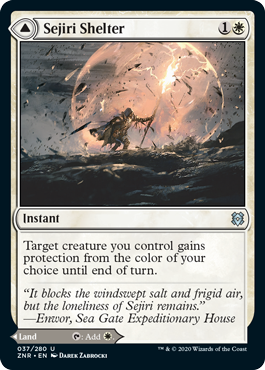
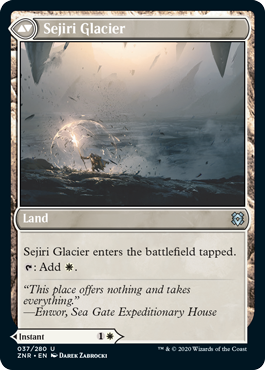
Sejiri Shelter
{1}{W}
Instant
Target creature you control gains protection from the color of your choice until end of turn.
/////
Sejiri Glacier
Land
Sejiri Glacier enters the battlefield tapped.
{T}: Add {W}.
Playing with Modal Double-Faced Cards
- To determine whether it is legal to play a modal double-faced card, consider only the characteristics of the face you're playing and ignore the other face's characteristics. For example, you can cast Sejiri Shelter if you've already played a land for the turn, and you can play Sejiri Glacier even if an effect stops you from casting instant spells.
- If an effect allows you to play a specific modal double-faced card, you may cast it as a spell or play it as a land, as determined by which face you choose to play. If an effect allows you to cast (rather than "play") a specific modal double-faced card, you can't play it as a land.
- If an effect allows you to play a land or cast a spell from among a group of cards, you may play or cast a modal double-faced card with any face that fits the criteria of that effect. For example, if Sejiri Shelter / Sejiri Glacier is in your graveyard and an effect allows you to play lands from your graveyard, you could play Sejiri Glacier. That effect doesn't allow you to cast Sejiri Shelter.
- The converted mana cost of a modal double-faced card is based on the characteristics of the face that's being considered. On the stack and battlefield, consider whichever face is up. In all other zones, consider only the front face. This is different than how the converted mana cost of a transforming double-faced card is determined.
- A modal double-faced card can't be transformed or be put onto the battlefield transformed. Ignore any instruction to transform a modal double-faced card or to put one onto the battlefield transformed.
General Information on Double-Faced Cards
- Each face of a double-faced card has its own set of characteristics: name, types, subtypes, abilities, and so on. While a double-faced card is on the stack or battlefield, consider only the characteristics of the face that's currently up. The other set of characteristics is ignored.
- While a double-faced card isn't on the stack or battlefield, consider only the characteristics of its front face. For example, the above card has only the characteristics of Sejiri Shelter in the graveyard, even if it was Sejiri Glacier on the battlefield before it was put into the graveyard. Notably, this means that Sejiri Shelter is a nonland card even though you could play it as a land.
- If an effect puts a double-faced card onto the battlefield, it enters with its front face up. If that front face can't be put onto the battlefield, it doesn't enter the battlefield. For example, if an effect exiles Sejiri Glacier and returns it to the battlefield, it remains in exile because an instant can't be put onto the battlefield.
- If an effect instructs a player to choose a card name, the name of either face may be chosen. If that effect or a linked ability refers to a spell with the chosen name being cast and/or a land with the chosen name being played, it considers only the chosen name, not the other face's name.
- In the Commander variant, a double-faced card's color identity is determined by the mana costs and mana symbols in the rules text of both faces combined. If either face has a color indicator or basic land type, those are also considered.
- One or both faces of a double-faced card may include a reminder about what's on the other face. This reminder text has no effect on gameplay.
- Each double-faced card has an icon in the top-left corner of each face. For modal double-faced cards in this set, these icons are a single triangle for the front face, and a double triangle for the back face. These icons have no effect on gameplay.
Using DFC Helper Cards
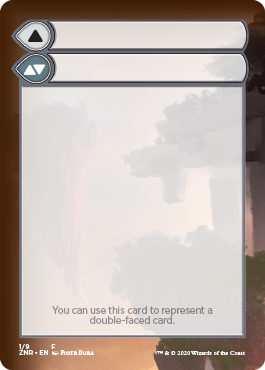
- It's important that the cards in your deck be indistinguishable from one another. To help you accomplish this with double-faced cards, you can use the helper card found in some Zendikar Rising booster packs. A helper card acts as a substitute for a double-faced card in hidden zones or wherever its identity is concealed (such as in exile if it's exiled face down). Using helper cards is optional, but in tournaments, players with double-faced cards must use either helper cards or opaque card sleeves (or both).
- You must have the actual double-faced card the helper card is representing with you. The double-faced card should be kept apart from the rest of the deck and your sideboard.
- A helper card can be included in a deck only when it's being used to represent a double-faced card.
- You must write clearly on the helper card to show which double-faced card it represents. The name of at least one face must be written on the helper card, and any other information visible on either face of the card may also be written. Information that isn't available on the card may not be written on a helper card.
- During the game, a helper card is considered to be the double-faced card it represents.
- If a helper card enters a public zone (the battlefield, the graveyard, the stack, or exile unless it's exiled face down), use the actual double-faced card and set the helper card aside. If the double-faced card is put into a hidden zone (your hand or library), use the helper card again.
- If a double-faced card is exiled face down or put onto the battlefield face down, keep its identity hidden by using the face-down helper card or opaque card sleeves (or both).
- Certain older sets include checklist cards to represent double-faced cards or meld cards from those sets. A Zendikar Rising helper card can be used to represent those double-faced cards. The same rules about what information may be written on helper cards apply.
New Game Mechanic: Party
There ain't no party like an adventuring party, and the expedition houses of Zendikar strongly encourage you to take a well-formed party on your journey. You never know when you'll need someone to heal you, sneak around, deliver a good solid punch, or harness the mystical forces that make up the very fabric of the Multiverse to produce the perfect cup of tea.
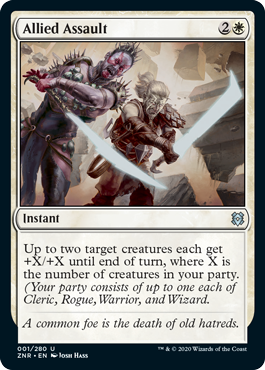
Allied Assault
{2}{W}
Instant
Up to two target creatures each get +X/+X until end of turn, where X is the number of creatures in your party. (Your party consists of up to one each of Cleric, Rogue, Warrior, and Wizard.)
- To determine "the number of creatures in your party," check whether you control a Cleric, whether you control a Rogue, whether you control a Warrior, and whether you control a Wizard. The number is the total number of those checks to which you answered yes. Each creature you control can be counted for only one of those checks.
- If a creature has more than one party creature type, and there are multiple ways to count that creature that could result in a different number of creatures in your party, the highest such number is used. For example, if you control a Cleric and a Cleric Wizard, the number of creatures in your party is two. You can't choose to have it be just one by counting the Cleric Wizard first as a Cleric.
- An ability referring to the number of creatures in your party gets a number from zero to four. Such abilities never ask which creatures are in your party, and you never have to designate specific creatures as being in your party. You can't choose to exclude creatures from this count to lower the number.
- Some cards refer to you having a "full party." This is true if the number of creatures in your party is four.
- Several cards have a cost reduction based on the number of creatures in your party. To determine the total cost of a spell, start with the mana cost or alternative cost you're paying, add any cost increases, then apply any cost reductions. The converted mana cost of the spell is determined only by its mana cost, no matter what the total cost to cast the spell was.
- If a spell has a cost reduction based on the number of creatures in your party, no player may attempt to change that number after you begin to cast the spell but before you pay the cost.
- If an ability of a creature counts the number of creatures in your party, that number is counted as the ability resolves. If that creature is still on the battlefield when the ability resolves, it'll be counted if appropriate.
Cleric Theme: Gaining Life
If you've got a Cleric in your party, you may be rewarded for gaining life.
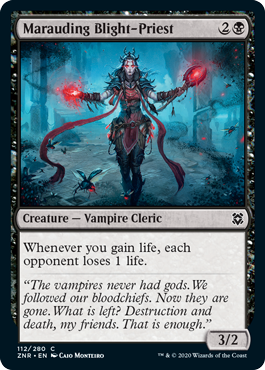
Marauding Blight-Priest
{2}{B}
Creature — Vampire Cleric
3/2
Whenever you gain life, each opponent loses 1 life.
- An ability that triggers "whenever you gain life" triggers just once for each life-gaining event, no matter how much life you gain.
- An ability that triggers whenever you gain life "for the first time each turn" won't trigger if you gain life during a turn before the permanent with that ability is on the battlefield, even if you gain life again later in the turn.
- Each creature with lifelink dealing combat damage causes a separate life-gaining event. For example, if two creatures you control with lifelink deal combat damage at the same time, a "whenever you gain life" ability will trigger twice. However, if a single creature you control with lifelink deals combat damage to multiple creatures, players, and/or planeswalkers at the same time (perhaps because it has trample or was blocked by more than one creature), the ability will trigger only once.
- If you gain an amount of life "for each" of something, that life is gained as one event and the ability will trigger only once.
- In a Two-Headed Giant game, life gained by your teammate won't cause the ability to trigger, even though it caused your team's life total to increase.
Rogue Theme: Cards in Graveyards
If you've got a Rogue in your party, you may be rewarded for having opponents whose graveyards just somehow happen to become full of cards.
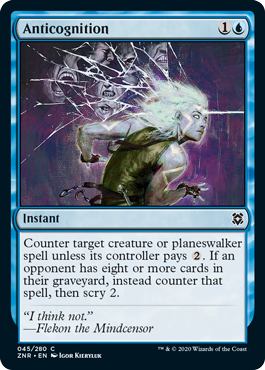
Anticognition
{1}{U}
Instant
Counter target creature or planeswalker spell unless its controller pays {2}. If an opponent has eight or more cards in their graveyard, instead counter that spell, then scry 2.
- An ability that offers a bonus if an opponent has eight or more cards in their graveyard won't provide additional benefits if more than one opponent has eight or more cards in their graveyard. There are also no additional benefits no matter how many cards are in an opponent's graveyard, as long as there are at least eight.
- In a multiplayer game, once an opponent leaves the game, they won't be considered for such an effect, no matter how many cards they had in their graveyard before leaving the game.
Warrior Theme: Snap-On Equipment
If you've got a Warrior in your party, you probably like to attack. A lot. Warriors in this set don't have a unifying mechanic, but they benefit greatly both from attacking and from these "snap-on" Equipment, each of which comes with one free attachment.
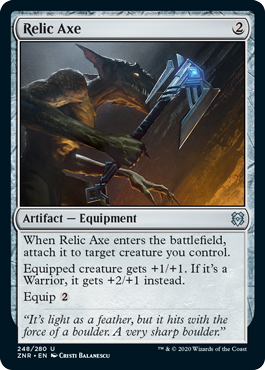
Relic Axe
{2}
Artifact — Equipment
When Relic Axe enters the battlefield, attach it to target creature you control.
Equipped creature gets +1/+1. If it's a Warrior, it gets +2/+1 instead.
Equip {2}
- Attaching an Equipment with its enters-the-battlefield triggered ability isn't the same as using its equip ability. You don't pay mana for the attachment, and if the Equipment enters at a time you couldn't cast a sorcery, you can still attach it to a creature you control.
- If the target creature becomes an illegal target, the Equipment remains on the battlefield unattached.
Wizard Theme: Casting Spells
If you've got a Wizard in your party, you may be rewarded for casting certain spells that Wizards like: instants, sorceries, and even more Wizards.
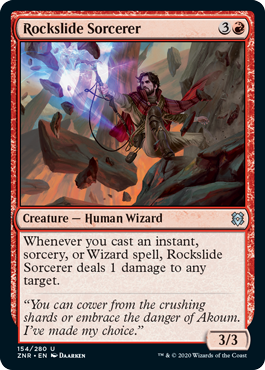
Rockslide Sorcerer
{3}{R}
Creature — Human Wizard
3/3
Whenever you cast an instant, sorcery, or Wizard spell, Rockslide Sorcerer deals 1 damage to any target.
- An ability that triggers when a player casts a spell resolves before the spell that caused it to trigger, but after targets have been chosen for that spell (if it has any targets). The ability resolves even if that spell is countered.
- A Wizard spell is one with the creature type Wizard. Spells that are Wizard-themed (such as Relic Amulet) aren't Wizard spells.
Returning Ability Word: Landfall
If you've got a land in your party—well, lands can't be party members, but you can certainly be rewarded each time one enters the battlefield under your control. The landfall ability word highlights these abilities for you. An ability word appears in italics and has no rules meaning.
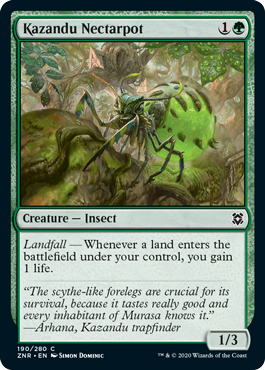
Kazandu Nectarpot
{1}{G}
Creature — Insect
1/3
Landfall — Whenever a land enters the battlefield under your control, you gain 1 life.
- A landfall ability triggers whenever a land enters the battlefield under your control for any reason. It triggers whenever you play a land, as well as whenever a spell or ability puts a land onto the battlefield under your control.
- A landfall ability doesn't trigger if a permanent already on the battlefield becomes a land.
- Whenever a land enters the battlefield under your control, each landfall ability of the permanents you control will trigger. You can put them on the stack in any order. The last ability you put on the stack will be the first one to resolve.
Returning Keyword Ability: Kicker
Kicker is a returning keyword that lets you pay an additional cost for a spell to give it a little more oomph.
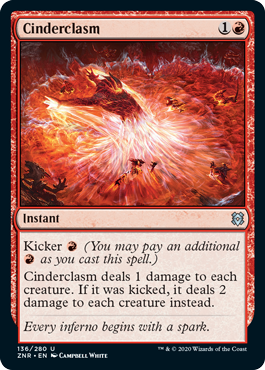
Cinderclasm
{1}{R}
Instant
Kicker {R} (You may pay an additional {R} as you cast this spell.)
Cinderclasm deals 1 damage to each creature. If it was kicked, it deals 2 damage to each creature instead.
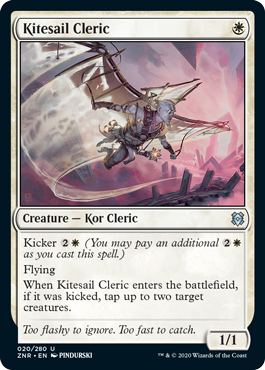
Kitesail Cleric
{W}
Creature — Kor Cleric
1/1
Kicker {2}{W} (You may pay an additional {2}{W} as you cast this spell.)
Flying
When Kitesail Cleric enters the battlefield, if it was kicked, tap up to two target creatures.
- Kicker represents an optional additional cost that you may choose to pay as you cast the spell.
A spell cast with that additional cost paid is "kicked." - You can't pay a kicker cost more than once.
- If you put a permanent with a kicker ability onto the battlefield without casting it, you can't kick it.
- If you copy a kicked spell, the copy is also kicked. If a card or token enters the battlefield as a copy of a permanent that's already on the battlefield, the new permanent isn't kicked, even if the original was.
- To determine a spell's total cost, start with the mana cost (or an alternative cost if another card's effect allows you to pay one instead), add any cost increases (such as kicker), then apply any cost reductions. The converted mana cost of the spell is determined only by its mana cost, no matter what the total cost to cast the spell was.
- Some instant or sorcery spells require alternative or additional targets if they're kicked. You ignore these targeting requirements if those spells aren't kicked, and you can't kick those spells unless you can choose the appropriate targets. On the other hand, you can kick a permanent spell even if you won't be able to choose targets for an enters-the-battlefield ability of that permanent once the spell resolves.
- An ability that triggers when a player casts a kicked spell resolves before the spell that caused it to trigger, but after targets have been chosen for that spell. It resolves even if that spell is countered.
- An ability that refers to "a kicker ability" refers to a card that has a kicker cost (or, on some cards in other sets, a multikicker cost), not one that has an ability that merely cares about kicker.
ZENDIKAR RISING CARD-SPECIFIC NOTES
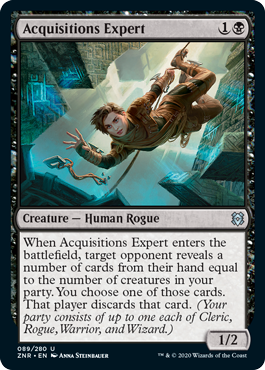
Acquisitions Expert
{1}{B}
Creature — Human Rogue
1/2
When Acquisitions Expert enters the battlefield, target opponent reveals a number of cards from their hand equal to the number of creatures in your party. You choose one of those cards. That player discards that card. (Your party consists of up to one each of Cleric, Rogue, Warrior, and Wizard.)
- If there are no creatures in your party as Acquisitions Expert's ability resolves, the target opponent reveals no cards and you choose no card.
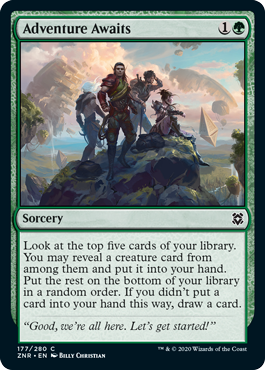
Adventure Awaits
{1}{G}
Sorcery
Look at the top five cards of your library. You may reveal a creature card from among them and put it into your hand. Put the rest on the bottom of your library in a random order. If you didn't put a card into your hand this way, draw a card.
- If you draw a card this way, that card is the next one in your library after putting the five cards from the top of your library on the bottom.
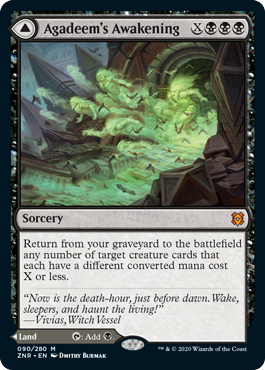
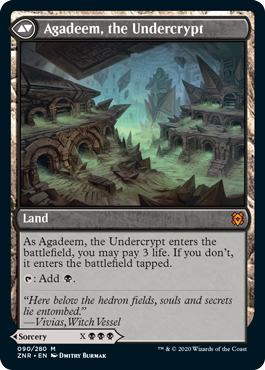
Agadeem's Awakening
{X}{B}{B}{B}
Sorcery
Return from your graveyard to the battlefield any number of target creature cards that each have a different converted mana cost X or less.
/////
Agadeem, the Undercrypt
Land
As Agadeem, the Undercrypt enters the battlefield, you may pay 3 life. If you don't, it enters the battlefield tapped.
{T}: Add {B}.
- For example, if X is 3, you may target up to four creature cards: one with converted mana cost 3, one with converted mana cost 2, one with converted mana cost 1, and one with converted mana cost 0.
- If X is 0 for Agadeem's Awakening, you can target one creature card with converted mana cost 0.
- If a card in a player's graveyard has {X} in its mana cost, X is considered to be 0 for that card.
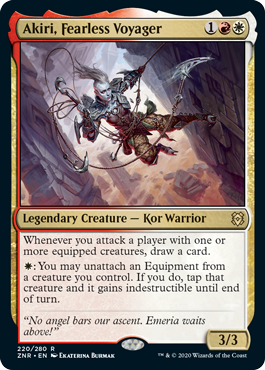
Akiri, Fearless Voyager
{1}{R}{W}
Legendary Creature — Kor Warrior
3/3
Whenever you attack a player with one or more equipped creatures, draw a card.
{W}: You may unattach an Equipment from a creature you control. If you do, tap that creature and it gains indestructible until end of turn.
- Akiri's first ability has you draw just one card per player you attack with an equipped creature, no matter how many equipped creatures you attack them with beyond the first and no matter how many Equipment that creature's carrying beyond the first.
- Equipped creatures attacking a planeswalker won't cause Akiri's first ability to trigger.
- The Equipment that's unattached remains on the battlefield.
- You choose which Equipment to unattach as Akiri's second ability resolves. Unattaching an Equipment from a creature won't affect other Equipment attached to that creature. No player can take actions between the time you unattach that Equipment and the time that the creature becomes tapped and gains indestructible.
- If the creature is already tapped, it just gains indestructible until end of turn.

Allied Assault
{2}{W}
Instant
Up to two target creatures each get +X/+X until end of turn, where X is the number of creatures in your party. (Your party consists of up to one each of Cleric, Rogue, Warrior, and Wizard.)
- The value of X is determined only as Allied Assault resolves. Once that happens, the value of X won't change later in the turn even if the number of creatures in your party changes.
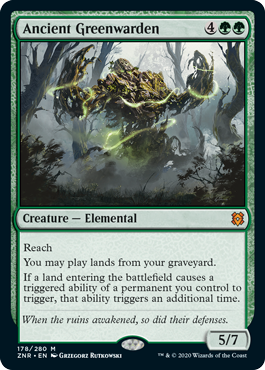
Ancient Greenwarden
{4}{G}{G}
Creature — Elemental
5/7
Reach
You may play lands from your graveyard.
If a land entering the battlefield causes a triggered ability of a permanent you control to trigger, that ability triggers an additional time.
- Ancient Greenwarden doesn't change the times when you can play those lands. You can still play only one land per turn, and only during your main phase when you have priority and the stack is empty.
- Ancient Greenwarden doesn't allow you to activate abilities (such as cycling) of land cards in your graveyard.
- Ancient Greenwarden allows you to play a modal double-faced card's land face, but not a nonland face.
- Ancient Greenwarden's third ability affects a land's own enters-the-battlefield triggered abilities as well as other triggered abilities that trigger when that land enters the battlefield, such as landfall abilities. Such triggered abilities start with "when" or "whenever."
- Replacement effects are unaffected by Ancient Greenwarden's third ability. This includes any abilities that apply "as [this land] enters the battlefield" and any ability that says the land enters the battlefield with counters.
- Ancient Greenwarden's effect doesn't copy the triggered ability; it causes the ability to trigger twice. Any choices made as you put the ability onto the stack, such as modes and targets, are made separately for each instance of the ability. Any choices made on resolution, such as whether to put counters on a permanent, are also made individually.
- The trigger event doesn't have to specifically refer to "lands." For example, an ability that triggers "whenever a creature enters the battlefield under your control" would trigger twice if the entering land is also a creature.
- An ability that triggers whenever you play a land won't trigger an additional time.
- Look at each permanent as it exists on the battlefield, taking into account continuous effects, to determine whether any triggered abilities will trigger multiple times. For example, if you control Ashaya, Soul of the Wild, a nontoken creature entering the battlefield will cause any appropriate abilities to trigger an additional time.
- If you control two Ancient Greenwardens, a land entering the battlefield causes abilities to trigger three times, not four. A third Ancient Greenwarden causes abilities to trigger four times, a fourth causes abilities to trigger five times, and so on.
- If a land entering the battlefield at the same time as Ancient Greenwarden (including Ancient Greenwarden itself if an effect causes it to be a land) causes a triggered ability of a permanent you control to trigger, that ability triggers an additional time.
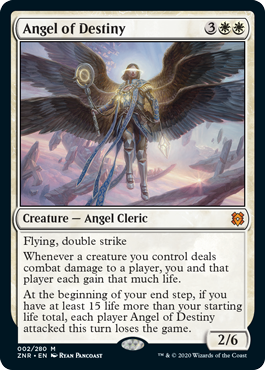
Angel of Destiny
{3}{W}{W}
Creature — Angel Cleric
2/6
Flying, double strike
Whenever a creature you control deals combat damage to a player, you and that player each gain that much life.
At the beginning of your end step, if you have at least 15 life more than your starting life total, each player Angel of Destiny attacked this turn loses the game.
- All first-strike combat damage is dealt at the same time, and, separately, all regular combat damage is dealt at the same time. If one of those amounts of combat damage is enough to cause the player being dealt damage to lose the game, Angel of Destiny's first triggered ability has you gain life, but the other player has already lost the game and can't gain life.
- If a creature you control somehow deals combat damage to you (most likely because its combat damage was redirected), you gain twice that much life as a single life-gaining event.
- If Angel of Destiny leaves the battlefield before your end step, its last ability won't trigger and won't cause a player to lose the game, even if Angel of Destiny attacked that player earlier.
- In a Two-Headed Giant game, Angel of Destiny's last ability can trigger as long as your team's life total is greater than your team's starting life total by 15 or more life.

Anticognition
{1}{U}
Instant
Counter target creature or planeswalker spell unless its controller pays {2}. If an opponent has eight or more cards in their graveyard, instead counter that spell, then scry 2.
- If an opponent has eight or more cards in their graveyard, Anticognition can still target only a creature or planeswalker spell.
- Anticognition will counter the spell and let you scry 2 if any opponent has eight or more cards in their graveyard, not just that spell's controller.
- Anticognition can target a spell that can't be countered. You'll still scry 2 if an opponent has eight or more cards in their graveyard.
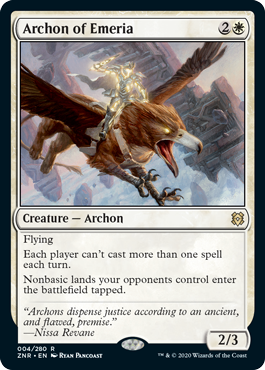
Archon of Emeria
{2}{W}
Creature — Archon
2/3
Flying
Each player can't cast more than one spell each turn.
Nonbasic lands your opponents control enter the battlefield tapped.
- Archon of Emeria looks at the entire turn to see if a player has cast a spell, even if Archon of Emeria wasn't on the battlefield when that spell was cast. Notably, you can't cast Archon of Emeria and then cast another spell during the same turn.
- If you cast a spell that was countered, you can't cast another spell during the same turn.
- If an effect says that a land enters tapped unless a condition is met or a cost is paid, that land enters tapped even if that condition is met or that cost is paid if it's affected by Archon of Emeria's second ability.
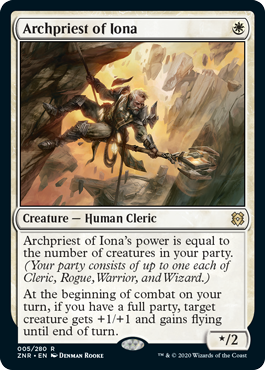
Archpriest of Iona
{W}
Creature — Human Cleric
*/2
Archpriest of Iona's power is equal to the number of creatures in your party. (Your party consists of up to one each of Cleric, Rogue, Warrior, and Wizard.)
At the beginning of combat on your turn, if you have a full party, target creature gets +1/+1 and gains flying until end of turn.
- The ability that defines Archpriest of Iona's power applies in all zones, not just the battlefield.
- The last ability won't trigger at all if you don't have a full party as your combat phase begins. It won't grant +1/+1 or flying if you don't have a full party as it resolves. The number of creatures in your party may change between these times, however.
- Once the target creature gets +1/+1 and gains flying, it keeps those bonuses even if you no longer have a full party later in the turn.
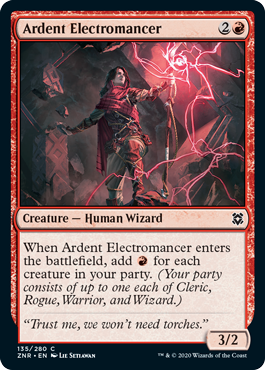
Ardent Electromancer
{2}{R}
Creature — Human Wizard
3/2
When Ardent Electromancer enters the battlefield, add {R} for each creature in your party. (Your party consists of up to one each of Cleric, Rogue, Warrior, and Wizard.)
- Ardent Electromancer's ability uses the stack and players may respond to it. It isn't a mana ability because the event that causes it to trigger isn't a mana ability.
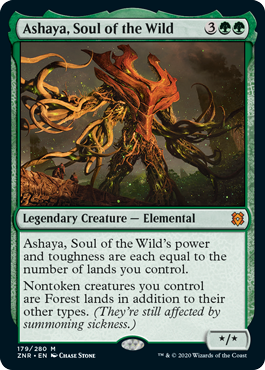
Ashaya, Soul of the Wild
{3}{G}{G}
Legendary Creature — Elemental
*/*
Ashaya, Soul of the Wild's power and toughness are each equal to the number of lands you control.
Nontoken creatures you control are Forest lands in addition to their other types. (They're still affected by summoning sickness.)
- The ability that defines Ashaya's power and toughness applies in all zones, not just the battlefield.
- As long as Ashaya is on the battlefield, it's affected by its second ability and thus its first ability counts itself.
- Because damage remains marked on a creature until the damage is removed as the turn ends, nonlethal damage dealt to Ashaya may become lethal if lands you control leave the battlefield during that turn.
- You can't play creature cards as lands; you'll still have to cast them as spells, and they'll enter the battlefield as lands (in addition to their other types).
- A land that's a Forest has the intrinsic mana ability "{T}: Add {G}."
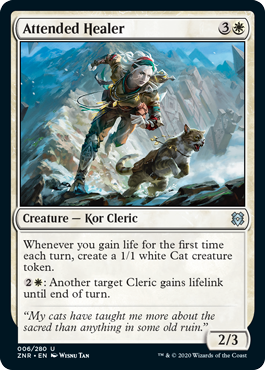
Attended Healer
{3}{W}
Creature — Kor Cleric
2/3
Whenever you gain life for the first time each turn, create a 1/1 white Cat creature token.
{2}{W}: Another target Cleric gains lifelink until end of turn.
- Multiple instances of lifelink on the same creature are redundant.
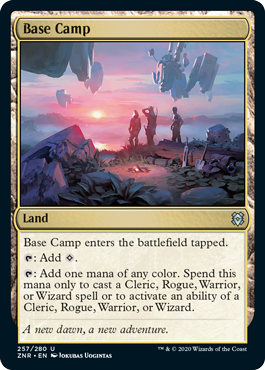
Base Camp
Land
Base Camp enters the battlefield tapped.
{T}: Add {C}.
{T}: Add one mana of any color. Spend this mana only to cast a Cleric, Rogue, Warrior, or Wizard spell or to activate an ability of a Cleric, Rogue, Warrior, or Wizard.
- The mana generated by Base Camp's last ability can't be spent to activate abilities of cards that aren't on the battlefield or to pay a cost in a resolving triggered ability.
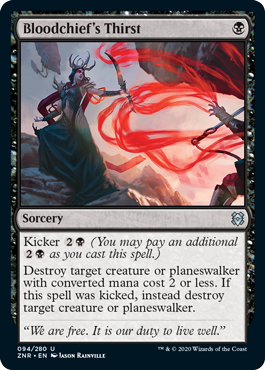
Bloodchief's Thirst
{B}
Sorcery
Kicker {2}{B} (You may pay an additional {2}{B} as you cast this spell.)
Destroy target creature or planeswalker with converted mana cost 2 or less. If this spell was kicked, instead destroy target creature or planeswalker.
- If a creature or planeswalker on the battlefield has {X} in its mana cost, X is considered to be 0.
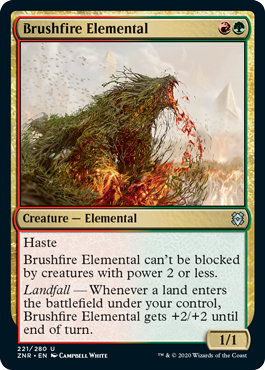
Brushfire Elemental
{R}{G}
Creature — Elemental
1/1
Haste
Brushfire Elemental can't be blocked by creatures with power 2 or less.
Landfall — Whenever a land enters the battlefield under your control, Brushfire Elemental gets +2/+2 until end of turn.
- Once a creature with power 3 or greater has blocked this creature, changing the power of the blocking creature won't cause this creature to become unblocked.
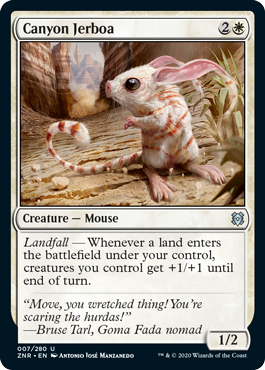
Canyon Jerboa
{2}{W}
Creature — Mouse
1/2
Landfall — Whenever a land enters the battlefield under your control, creatures you control get +1/+1 until end of turn.
- Canyon Jerboa's ability affects only creatures you control at the time it resolves. Creatures you begin to control later in the turn won't get +1/+1.
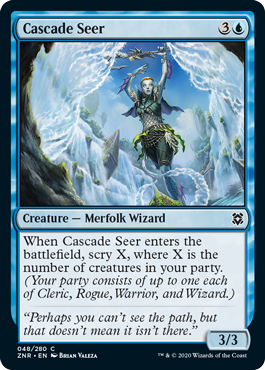
Cascade Seer
{3}{U}
Creature — Merfolk Wizard
3/3
When Cascade Seer enters the battlefield, scry X, where X is the number of creatures in your party. (Your party consists of up to one each of Cleric, Rogue, Warrior, and Wizard.)
- If there are no creatures in your party as Cascade Seer's ability resolves, you don't scry at all. Abilities that trigger whenever you scry don't trigger.
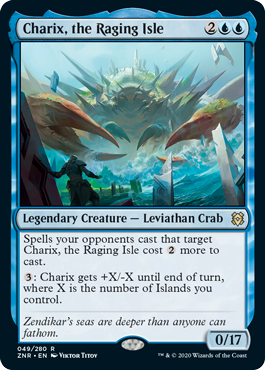
Charix, the Raging Isle
{2}{U}{U}
Legendary Creature — Leviathan Crab
0/17
Spells your opponents cast that target Charix, the Raging Isle cost {2} more to cast.
{3}: Charix gets +X/-X until end of turn, where X is the number of Islands you control.
- To determine the total cost of a spell, start with the mana cost or alternative cost you're paying, add any cost increases (such as that of Charix), then apply any cost reductions. The converted mana cost of the spell is determined only by its mana cost, no matter what the total cost to cast the spell was.
- An opponent's spell that targets Charix more than once costs only {2} more to cast.
- Each time you activate Charix's last ability, the value of X for that instance of the ability is determined only as that ability resolves. Once that happens, the size of the power-and-toughness change for that instance of the ability won't change later in the turn, even if the number of Islands you control does change.
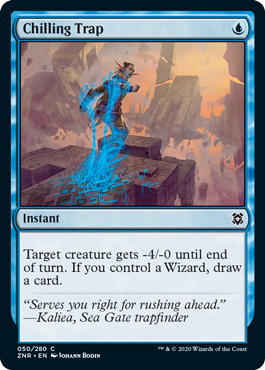
Chilling Trap
{U}
Instant
Target creature gets -4/-0 until end of turn. If you control a Wizard, draw a card.
- If the target creature is an illegal target by the time Chilling Trap tries to resolve, the spell doesn't resolve. You don't draw a card if you control a Wizard.
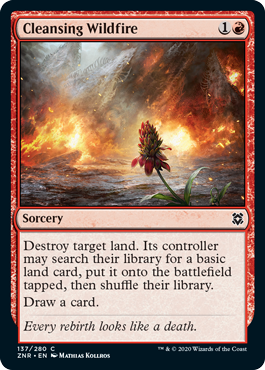
Cleansing Wildfire
{1}{R}
Sorcery
Destroy target land. Its controller may search their library for a basic land card, put it onto the battlefield tapped, then shuffle their library.
Draw a card.
- If the target land is an illegal target by the time Cleansing Wildfire tries to resolve, the spell doesn't resolve. No player searches for a basic land card and you don't draw a card. If the target is legal but not destroyed (most likely because it has indestructible), its controller does search for a basic land card and you do draw a card.
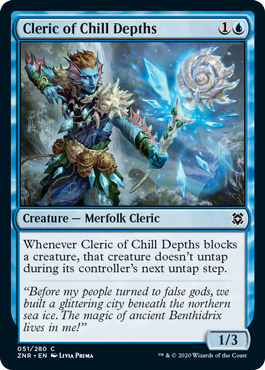
Cleric of Chill Depths
{1}{U}
Creature — Merfolk Cleric
1/3
Whenever Cleric of Chill Depths blocks a creature, that creature doesn't untap during its controller's next untap step.
- The blocked creature doesn't untap even if Cleric of Chill Depths leaves the battlefield before that creature's controller's next upkeep.
- If the blocked creature is untapped (most likely because it has vigilance), the ability doesn't tap it.
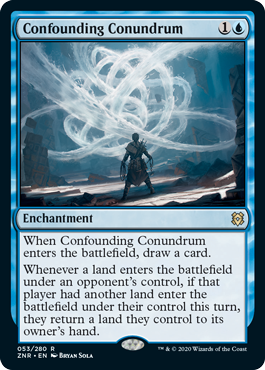
Confounding Conundrum
{1}{U}
Enchantment
When Confounding Conundrum enters the battlefield, draw a card.
Whenever a land enters the battlefield under an opponent's control, if that player had another land enter the battlefield under their control this turn, they return a land they control to its owner's hand.
- The player may return any land they control to its owner's hand, not just one of those that entered this turn.
- If an opponent has had no lands enter under their control and then two or more lands enter at the same time, Confounding Conundrum's second ability triggers for each of those lands.
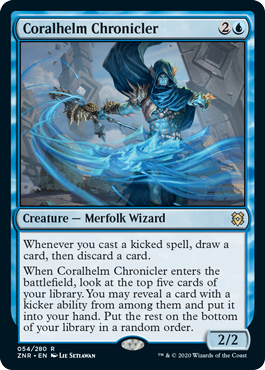
Coralhelm Chronicler
{2}{U}
Creature — Merfolk Wizard
2/2
Whenever you cast a kicked spell, draw a card, then discard a card.
When Coralhelm Chronicler enters the battlefield, look at the top five cards of your library. You may reveal a card with a kicker ability from among them and put it into your hand. Put the rest on the bottom of your library in a random order.
- You draw a card and discard a card while Coralhelm Chronicler's first ability is resolving. No player may take actions between those events, and nothing can happen.
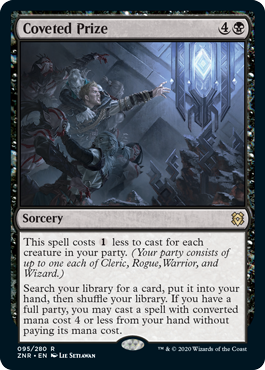
Coveted Prize
{4}{B}
Sorcery
This spell costs {1} less to cast for each creature in your party. (Your party consists of up to one each of Cleric, Rogue, Warrior, and Wizard.)
Search your library for a card, put it into your hand, then shuffle your library. If you have a full party, you may cast a spell with converted mana cost 4 or less from your hand without paying its mana cost.
- If you have a full party and wish to cast a spell with Coveted Prize's effect, you do so as part of the resolution of Coveted Prize after searching for a card. You can't wait to cast it later in the turn. Timing permissions based on a card's type are ignored.
- The card you search for may be the one you cast.
- If you cast a card "without paying its mana cost," you can't choose to cast it for any alternative costs. You can, however, pay additional costs. If the card has any mandatory additional costs, you must pay those to cast the card.
- If the card has {X} in its mana cost, you must choose 0 as the value of X when casting it without paying its mana cost.
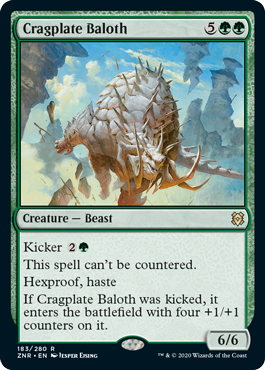
Cragplate Baloth
{5}{G}{G}
Creature — Beast
6/6
Kicker {2}{G}
This spell can't be countered.
Hexproof, haste
If Cragplate Baloth was kicked, it enters the battlefield with four +1/+1 counters on it.
- A spell or ability that counters spells can still target Cragplate Baloth. When that spell or ability resolves, Cragplate Baloth won't be countered, but any additional effects of the countering spell or ability will still happen.
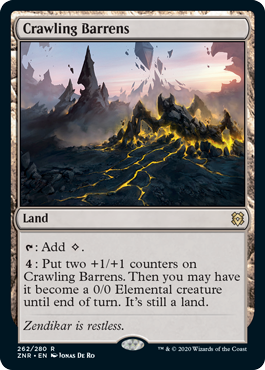
Crawling Barrens
Land
{T}: Add {C}.
{4}: Put two +1/+1 counters on Crawling Barrens. Then you may have it become a 0/0 Elemental creature until end of turn. It's still a land.
- You can activate Crawling Barrens's second ability even if it's already a creature.
- Counters on Crawling Barrens remain on it when it stops being a creature. If it becomes a creature later, they'll apply to it.
- Unless Crawling Barrens is already a creature, its second ability causes the +1/+1 counters to be put onto a noncreature land. Abilities that apply or trigger when counters are put on a creature you control won't do so.
- A noncreature permanent that turns into a creature can attack, and its {T} abilities can be activated, only if its controller has continuously controlled that permanent since the beginning of their most recent turn. It doesn't matter how long the permanent has been a creature.
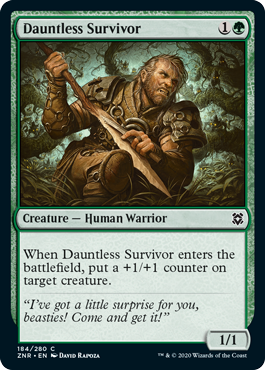
Dauntless Survivor
{1}{G}
Creature — Human Warrior
1/1
When Dauntless Survivor enters the battlefield, put a +1/+1 counter on target creature.
- Dauntless Survivor can be the target of its own ability.
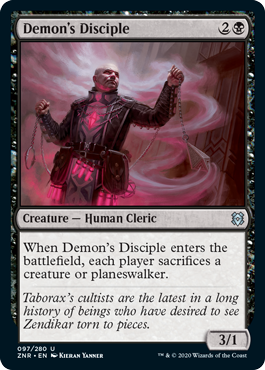
Demon's Disciple
{2}{B}
Creature — Human Cleric
3/1
When Demon's Disciple enters the battlefield, each player sacrifices a creature or planeswalker.
- As the triggered ability resolves, first the player whose turn it is chooses a creature or planeswalker they control, then each other player in turn order does the same, knowing the choices made before them. Then all the chosen creatures and/or planeswalkers are sacrificed at the same time.
- Demon's Disciple can be the creature sacrificed for its own ability.
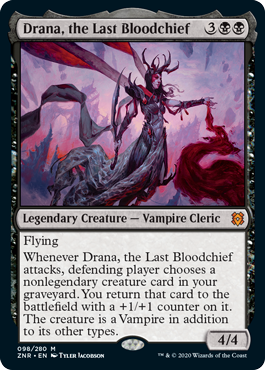
Drana, the Last Bloodchief
{3}{B}{B}
Legendary Creature — Vampire Cleric
4/4
Flying
Whenever Drana, the Last Bloodchief attacks, defending player chooses a nonlegendary creature card in your graveyard. You return that card to the battlefield with a +1/+1 counter on it. The creature is a Vampire in addition to its other types.
- If Drana attacks a planeswalker, that planeswalker's controller is the defending player.
- The defending player chooses a card and you put it onto the battlefield all while Drana's ability is resolving. No player may take actions in between those events.
- Because all attackers are declared at the same time, the returned creature can't attack during the same combat it returns, even if it has haste.
- The returned creature remains a Vampire in addition to its other types even after Drana leaves the battlefield.
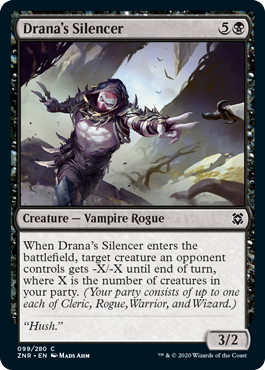
Drana's Silencer
{5}{B}
Creature — Vampire Rogue
3/2
When Drana's Silencer enters the battlefield, target creature an opponent controls gets -X/-X until end of turn, where X is the number of creatures in your party. (Your party consists of up to one each of Cleric, Rogue, Warrior, and Wizard.)
- The value of X is determined only as Drana's Silencer's ability resolves. Once that happens, the value of X won't change later in the turn even if the number of creatures in your party changes.
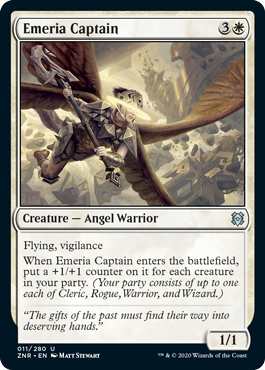
Emeria Captain
{3}{W}
Creature — Angel Warrior
1/1
Flying, vigilance
When Emeria Captain enters the battlefield, put a +1/+1 counter on it for each creature in your party. (Your party consists of up to one each of Cleric, Rogue, Warrior, and Wizard.)
- Because Emeria Captain receives its +1/+1 counters from a triggered ability rather than a replacement effect, players may take actions while that triggered ability is on the stack and Emeria Captain's toughness is just 1.
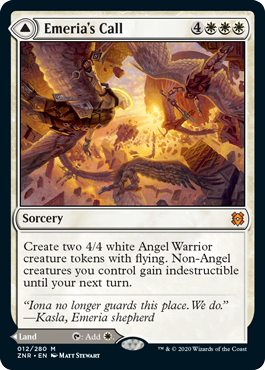
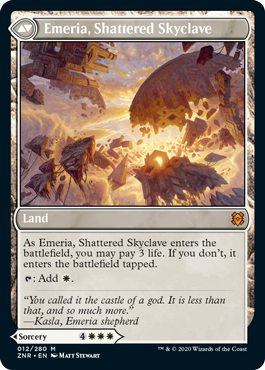
Emeria's Call
{4}{W}{W}{W}
Sorcery
Create two 4/4 white Angel Warrior creature tokens with flying. Non-Angel creatures you control gain indestructible until your next turn.
/////
Emeria, Shattered Skyclave
Land
As Emeria, Shattered Skyclave enters the battlefield, you may pay 3 life. If you don't, it enters the battlefield tapped.
{T}: Add {W}.
- Emeria's Call affects only creatures you control at the time it resolves. Creatures you begin to control later won't gain indestructible.
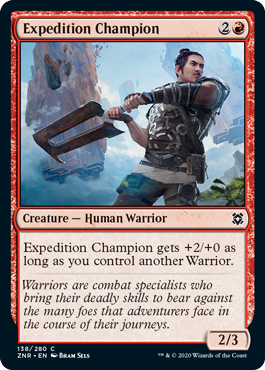
Expedition Champion
{2}{R}
Creature — Human Warrior
2/3
Expedition Champion gets +2/+0 as long as you control another Warrior.
- Expedition Champion gets just +2/+0, no matter how many other Warriors you control beyond the first.
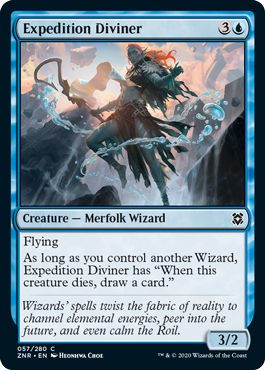
Expedition Diviner
{3}{U}
Creature — Merfolk Wizard
3/2
Flying
As long as you control another Wizard, Expedition Diviner has "When this creature dies, draw a card."
- Expedition Diviner has just one instance of its triggered ability, no matter how many other Wizards you control beyond the first.
- If Expedition Diviner dies at the same time that each other Wizard you control leaves the battlefield, its ability triggers. For example, if the only creatures you control are two Expedition Diviners and both die at the same time, their abilities each trigger.
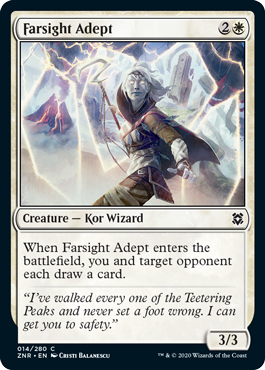
Farsight Adept
{2}{W}
Creature — Kor Wizard
3/3
When Farsight Adept enters the battlefield, you and target opponent each draw a card.
- If Farsight Adept's ability can't legally target an opponent, or if the ability's target becomes illegal while the ability is on the stack, you don't draw a card.
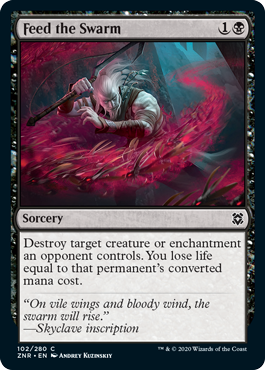
Feed the Swarm
{1}{B}
Sorcery
Destroy target creature or enchantment an opponent controls. You lose life equal to that permanent's converted mana cost.
- If the target permanent is an illegal target by the time Feed the Swarm tries to resolve, the spell doesn't resolve. You don't lose any life. If the target is legal but not destroyed (most likely because it has indestructible), you do lose life.
- The amount of life you lose is determined by the permanent's converted mana cost as it last existed on the battlefield.
- If a permanent on the battlefield has {X} in its mana cost, X is considered to be 0.
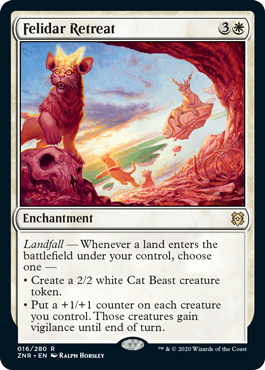
Felidar Retreat
{3}{W}
Enchantment
Landfall — Whenever a land enters the battlefield under your control, choose one —
• Create a 2/2 white Cat Beast creature token.
• Put a +1/+1 counter on each creature you control. Those creatures gain vigilance until end of turn.
- Felidar Retreat's second mode affects only creatures you control at the time the ability resolves, including creatures you control but that for some reason didn't get a +1/+1 counter. Creatures you begin to control later in the turn won't gain vigilance or get a +1/+1 counter.
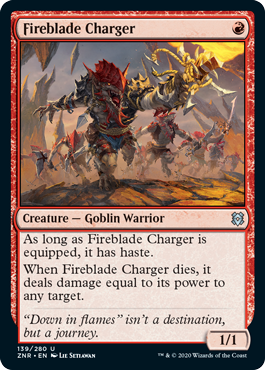
Fireblade Charger
{R}
Creature — Goblin Warrior
1/1
As long as Fireblade Charger is equipped, it has haste.
When Fireblade Charger dies, it deals damage equal to its power to any target.
- Fireblade Charger's last known existence on the battlefield is checked to determine its power. If its power was 0 or negative, its ability has no effect.
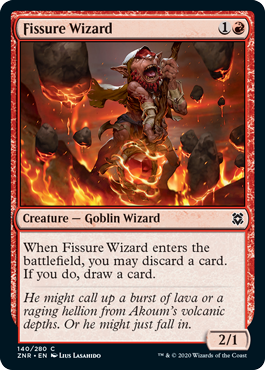
Fissure Wizard
{1}{R}
Creature — Goblin Wizard
2/1
When Fissure Wizard enters the battlefield, you may discard a card. If you do, draw a card.
- While resolving Fissure Wizard's ability, you can't discard more than one card.
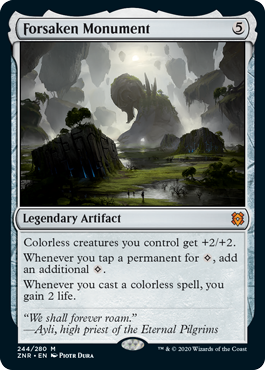
Forsaken Monument
{5}
Legendary Artifact
Colorless creatures you control get +2/+2.
Whenever you tap a permanent for {C}, add an additional {C}.
Whenever you cast a colorless spell, you gain 2 life.
- A land is normally colorless, regardless of what colors of mana that land can produce. If an effect makes a colorless land into a creature without specifying that it becomes a certain color, the land creature gets +2/+2.
- You "tap a permanent for {C}" only if you activate a mana ability of that permanent that includes the {T} symbol in its cost, and only if it produces one or more {C} as it resolves.
- If you tap a permanent for more than one {C}, you add only one additional {C}.
- An ability that triggers when a player casts a spell resolves before the spell that caused it to trigger. It resolves even if that spell is countered.
- Forsaken Monument's last ability won't trigger when you play a land.
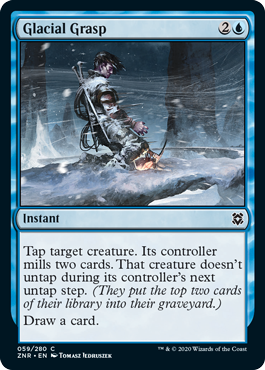
Glacial Grasp
{2}{U}
Instant
Tap target creature. Its controller mills two cards. That creature doesn't untap during its controller's next untap step. (They put the top two cards of their library into their graveyard.)
Draw a card.
- If the target creature is an illegal target by the time Glacial Grasp tries to resolve, the spell doesn't resolve. No player mills or draws any cards, and the creature won't be stopped from untapping. If the target is legal but Glacial Grasp doesn't tap it (most likely because it's already tapped), the rest of Glacial Grasp's effects still happen: that creature won't untap during its controller's next untap step, that player mills two cards, and you draw a card.
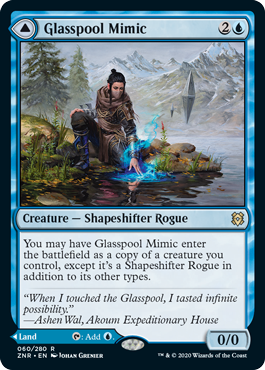
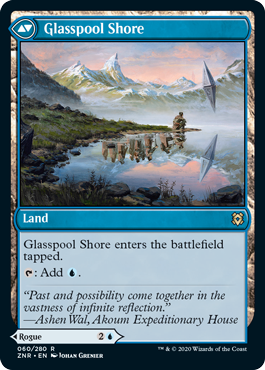
Glasspool Mimic
{2}{U}
Creature — Shapeshifter Rogue
0/0
You may have Glasspool Mimic enter the battlefield as a copy of a creature you control, except it's a Shapeshifter Rogue in addition to its other types.
/////
Glasspool Shore
Land
Glasspool Shore enters the battlefield tapped.
{T}: Add {U}.
- Glasspool Mimic copies exactly what was printed on the original creature (unless that creature is copying something else or is a token; see below), except that it's also a Shapeshifter Rogue. It doesn't copy whether that creature is tapped or untapped, whether it has any counters on it or any Auras and Equipment attached to it, or any non-copy effects that have changed its power, toughness, types, color, or so on. Most notably, if it copies a creature that's not normally a creature, it won't be a creature.
- If Glasspool Mimic isn't a creature, most likely because it copied a creature that was only temporarily a creature, it won't be a Shapeshifter Rogue, even if it becomes a creature later.
- If the copied creature has {X} in its mana cost, X is considered to be 0.
- If the chosen creature is copying something else (for example, if the chosen creature is another Glasspool Mimic), then Glasspool Mimic enters the battlefield as whatever the chosen creature copied.
- If another creature becomes a copy of Glasspool Mimic, that creature is also a Shapeshifter Rogue.
- If the chosen creature is a token, Glasspool Mimic copies the original characteristics of that token as stated by the effect that put the token onto the battlefield. Glasspool Mimic doesn't become a token in this case.
- Any enters-the-battlefield abilities of the copied creature will trigger when Glasspool Mimic enters the battlefield. Any "as [this creature] enters the battlefield" or "[this creature] enters the battlefield with" abilities of the chosen creature will also work.
- If Glasspool Mimic somehow enters the battlefield at the same time as another creature, it can't become a copy of that creature. You may choose only a creature that's already on the battlefield.
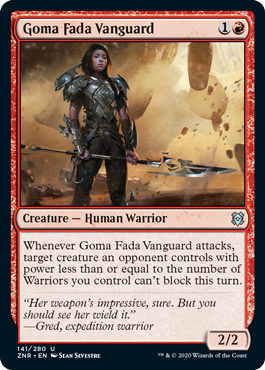
Goma Fada Vanguard
{1}{R}
Creature — Human Warrior
2/2
Whenever Goma Fada Vanguard attacks, target creature an opponent controls with power less than or equal to the number of Warriors you control can't block this turn.
- The power of the target creature and the number of Warriors you control are checked only as Goma Fada Vanguard's ability is put onto the stack and as that ability resolves. If the creature's power becomes greater after the ability has resolved, it still can't block.
- The target creature is restricted from blocking anything, not just Goma Fada Vanguard.
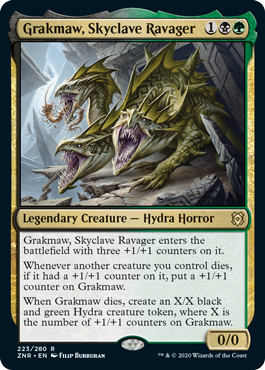
Grakmaw, Skyclave Ravager
{1}{B}{G}
Legendary Creature — Hydra Horror
0/0
Grakmaw, Skyclave Ravager enters the battlefield with three +1/+1 counters on it.
Whenever another creature you control dies, if it had a +1/+1 counter on it, put a +1/+1 counter on Grakmaw.
When Grakmaw dies, create an X/X black and green Hydra creature token, where X is the number of +1/+1 counters on Grakmaw.
- Grakmaw's second ability puts just one +1/+1 counter on it, no matter how many counters the dying creature had.
- If a creature with a +1/+1 counter on it dies after receiving too many -1/-1 counters, it dies at the same time that the counters are removed, and Grakmaw's second ability triggers. Similarly, if Grakmaw dies after receiving too many -1/-1 counters, use the number of +1/+1 counters it had prior to receiving the -1/-1 counters to determine the value of X.
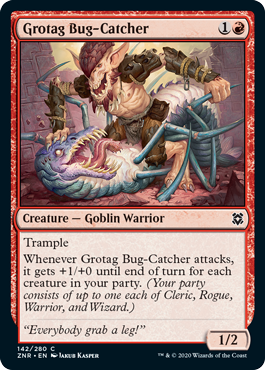
Grotag Bug-Catcher
{1}{R}
Creature — Goblin Warrior
1/2
Trample
Whenever Grotag Bug-Catcher attacks, it gets +1/+0 until end of turn for each creature in your party. (Your party consists of up to one each of Cleric, Rogue, Warrior, and Wizard.)
- The bonus is determined only as Grotag Bug-Catcher's ability resolves. Once that happens, the size of the bonus won't change later in the turn even if the number of creatures in your party changes.
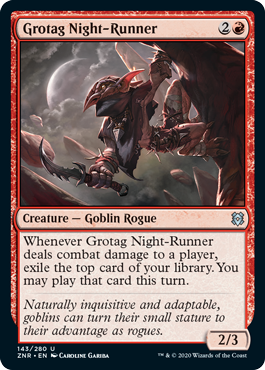
Grotag Night-Runner
{2}{R}
Creature — Goblin Rogue
2/3
Whenever Grotag Night-Runner deals combat damage to a player, exile the top card of your library. You may play that card this turn.
- You must follow the normal timing permissions and restrictions for the exiled card. If it's a land, you can't play it unless you have land plays available.
- You'll still pay all costs for a spell cast this way, including additional costs. You may also pay alternative costs if any are available.
- If you don't play the exiled card, it remains exiled.
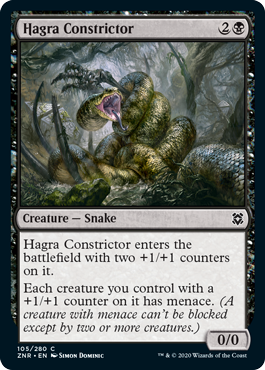
Hagra Constrictor
{2}{B}
Creature — Snake
0/0
Hagra Constrictor enters the battlefield with two +1/+1 counters on it.
Each creature you control with a +1/+1 counter on it has menace. (A creature with menace can't be blocked except by two or more creatures.)
- Multiple instances of menace on the same creature are redundant.
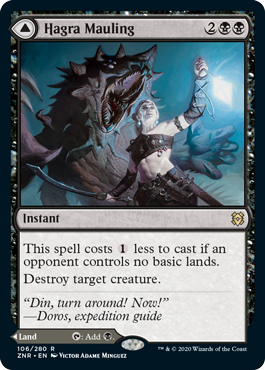
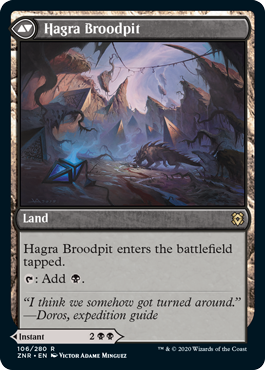
Hagra Mauling
{2}{B}{B}
Instant
This spell costs {1} less to cast if an opponent controls no basic lands.
Destroy target creature.
/////
Hagra Broodpit
Land
Hagra Broodpit enters the battlefield tapped.
{T}: Add {B}.
- Hagra Mauling's first ability reduces the cost by only {1}, even if you have two opponents with no basic lands. It reduces the cost even if some opponents control basic lands, as long as one controls no basic lands.
- The opponent who controls no basic lands doesn't have to be the controller of the target creature for Hagra Mauling's cost to be reduced.
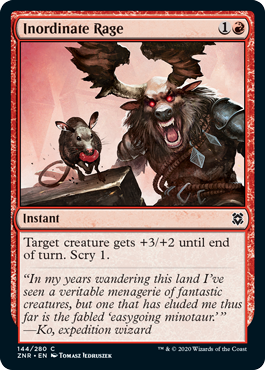
Inordinate Rage
{1}{R}
Instant
Target creature gets +3/+2 until end of turn. Scry 1.
- If the target creature is an illegal target by the time Inordinate Rage tries to resolve, the spell doesn't resolve. You don't scry 1.
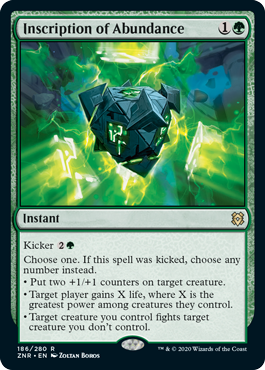
Inscription of Abundance
{1}{G}
Instant
Kicker {2}{G}
Choose one. If this spell was kicked, choose any number instead.
• Put two +1/+1 counters on target creature.
• Target player gains X life, where X is the greatest power among creatures they control.
• Target creature you control fights target creature you don't control.
- If you kick Inscription of Abundance, you can't choose any one mode more than once.
- If more than one mode is chosen, perform them in the order written. Nothing can happen in between, however, and no player may choose to take actions. Any abilities that trigger will be put onto the stack after the spell has finished resolving.
- If any targets become illegal, the other targets will still be affected as appropriate.
- If the second mode is chosen and each creature the target player controls has negative power, that player doesn't gain or lose life.
- If either target creature is an illegal target as Inscription of Abundance resolves with its last mode chosen, no creature will deal or be dealt damage.
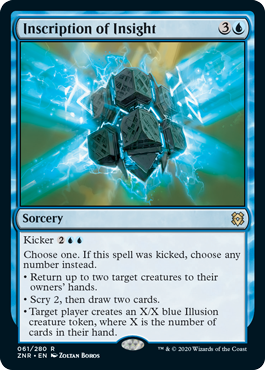
Inscription of Insight
{3}{U}
Sorcery
Kicker {2}{U}{U}
Choose one. If this spell was kicked, choose any number instead.
• Return up to two target creatures to their owners' hands.
• Scry 2, then draw two cards.
• Target player creates an X/X blue Illusion creature token, where X is the number of cards in their hand.
- If you kick Inscription of Insight, you can't choose any one mode more than once.
- If more than one mode is chosen, perform them in the order written. Nothing can happen in between, however, and no player may choose to take actions. Any abilities that trigger will be put onto the stack after the spell has finished resolving.
- If any targets become illegal, the other targets will still be affected as appropriate. If any targets are chosen and every target becomes illegal, Inscription of Insight doesn't resolve. You won't scry 2 or draw two cards if the middle mode was chosen.
- The value of X is determined only as you perform the third mode while Inscription of Insight is resolving. Once that happens, the value of X won't change even if the number of cards in the player's hand changes.
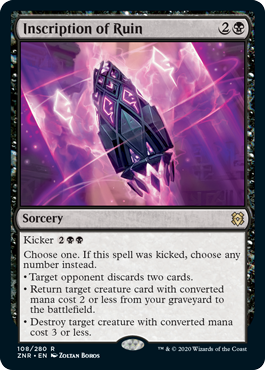
Inscription of Ruin
{2}{B}
Sorcery
Kicker {2}{B}{B}
Choose one. If this spell was kicked, choose any number instead.
• Target opponent discards two cards.
• Return target creature card with converted mana cost 2 or less from your graveyard to the battlefield.
• Destroy target creature with converted mana cost 3 or less.
- If you kick Inscription of Ruin, you can't choose any one mode more than once.
- If more than one mode is chosen, perform them in the order written. Nothing can happen in between, however, and no player may choose to take actions. Any abilities that trigger will be put onto the stack after the spell has finished resolving.
- If any targets become illegal, the other targets will still be affected as appropriate.
- If a card in a player's graveyard or a creature on the battlefield has {X} in its mana cost, X is considered to be 0.
- Because targets are chosen as you cast a spell, you can't have Inscription of Ruin return a creature card and then destroy that creature.
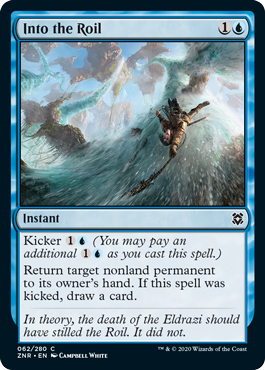
Into the Roil
{1}{U}
Instant
Kicker {1}{U} (You may pay an additional {1}{U} as you cast this spell.)
Return target nonland permanent to its owner's hand. If this spell was kicked, draw a card.
- If the target nonland permanent is an illegal target by the time Into the Roil tries to resolve, the spell doesn't resolve. You don't draw a card if it was kicked.
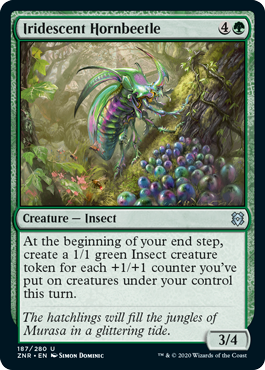
Iridescent Hornbeetle
{4}{G}
Creature — Insect
3/4
At the beginning of your end step, create a 1/1 green Insect creature token for each +1/+1 counter you've put on creatures under your control this turn.
- Iridescent Hornbeetle's ability counts the number of +1/+1 counters you've put on your creatures, even if that happened before Iridescent Hornbeetle was on the battlefield, and even if those creatures are no longer on the battlefield or under your control (and, in some rare cases, even if those creatures aren't creatures anymore).
- If a creature enters the battlefield under your control with +1/+1 counters on it, Iridescent Hornbeetle's ability counts those counters.
- If Iridescent Hornbeetle leaves the battlefield before your end step, its ability won't trigger at all. You won't create any tokens.
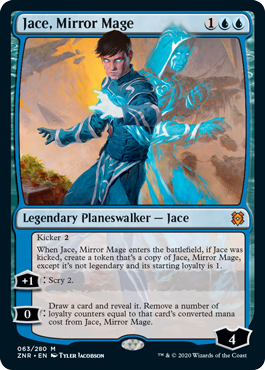
Jace, Mirror Mage
{1}{U}{U}
Legendary Planeswalker — Jace
4
Kicker {2}
When Jace, Mirror Mage enters the battlefield, if Jace was kicked, create a token that's a copy of Jace, Mirror Mage, except it's not legendary and its starting loyalty is 1.
+1: Scry 2.
0: Draw a card and reveal it. Remove a number of loyalty counters equal to that card's converted mana cost from Jace, Mirror Mage.
- The token from Jace's triggered ability copies exactly what is printed on Jace and nothing else. It doesn't copy how many counters are on him, or any non-copy effects that have changed his color or types, and so on. It enters the battlefield with one loyalty counter. You can activate one loyalty ability of each of the Jaces this turn.
- The token created by Jace's triggered ability doesn't have the legendary supertype and has a starting loyalty of 1 rather than 4. If another object becomes a copy of the token, that copy also won't be legendary and will have a starting loyalty of 1.
- You can control one legendary Jace, Mirror Mage in addition to any number of nonlegendary copies of Jace, Mirror Mage.
- While resolving Jace's last ability, you must reveal the card before it's mixed with the other cards in your hand.
- If a card in a player's hand has {X} in its mana cost, X is considered to be 0.
- If the card draw from Jace's last ability is modified by a replacement effect, you don't reveal any card, even if the draw was replaced by one or more card draws. No loyalty counters will be removed from Jace in that case.
- If the converted mana cost of the drawn card is greater than Jace's loyalty, you remove all loyalty counters from him. He'll be put into your graveyard as a state-based action before you can take any actions.
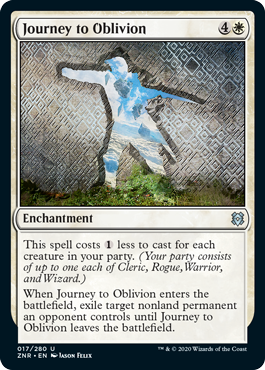
Journey to Oblivion
{4}{W}
Enchantment
This spell costs {1} less to cast for each creature in your party. (Your party consists of up to one each of Cleric, Rogue, Warrior, and Wizard.)
When Journey to Oblivion enters the battlefield, exile target nonland permanent an opponent controls until Journey to Oblivion leaves the battlefield.
- If Journey to Oblivion leaves the battlefield before its triggered ability resolves, the target permanent won't be exiled.
- Auras attached to the exiled permanent will be put into their owners' graveyards. Any Equipment will become unattached and remain on the battlefield. Any counters on the exiled permanent will cease to exist. When the card returns to the battlefield, it will be a new object with no connection to the card that was exiled.
- If a token is exiled this way, it will cease to exist and won't return to the battlefield.
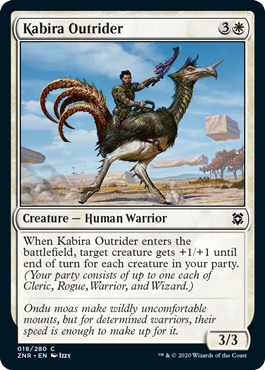
Kabira Outrider
{3}{W}
Creature — Human Warrior
3/3
When Kabira Outrider enters the battlefield, target creature gets +1/+1 until end of turn for each creature in your party. (Your party consists of up to one each of Cleric, Rogue, Warrior, and Wizard.)
- The bonus is determined only as Kabira Outrider's ability resolves. Once that happens, the size of the bonus won't change later in the turn even if the number of creatures in your party changes.
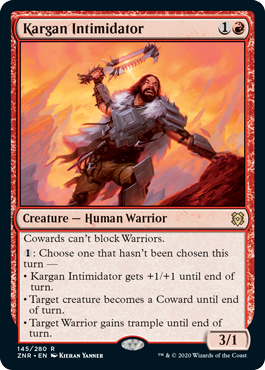
Kargan Intimidator
{1}{R}
Creature — Human Warrior
3/1
Cowards can't block Warriors.
{1}: Choose one that hasn't been chosen this turn —
• Kargan Intimidator gets +1/+1 until end of turn.
• Target creature becomes a Coward until end of turn.
• Target Warrior gains trample until end of turn.
- Once a creature has blocked a Warrior, turning that creature into a Coward won't remove it from combat or cause the Warrior to become unblocked.
- If you control two or more Kargan Intimidators, track which modes have been chosen each turn for each one's ability separately.
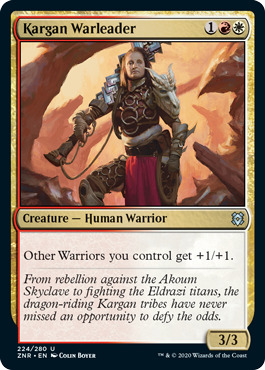
Kargan Warleader
{1}{R}{W}
Creature — Human Warrior
3/3
Other Warriors you control get +1/+1.
- Because damage remains marked on a creature until the damage is removed as the turn ends, nonlethal damage dealt to another Warrior you control may become lethal if Kargan Warleader leaves the battlefield during that turn.
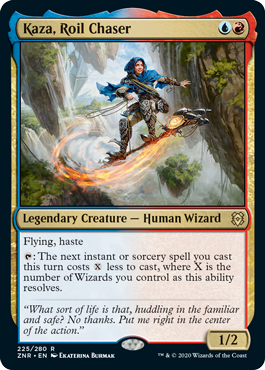
Kaza, Roil Chaser
{U}{R}
Legendary Creature — Human Wizard
1/2
Flying, haste
{T}: The next instant or sorcery spell you cast this turn costs {X} less to cast, where X is the number of Wizards you control as this ability resolves.
- To determine the total cost of a spell, start with the mana cost or alternative cost you're paying, add any cost increases, then apply any cost reductions (such as that of Kaza's activated ability). The converted mana cost of the spell is determined only by its mana cost, no matter what the total cost to cast the spell was.
- Kaza's cost reduction can reduce only generic mana in a spell's cost. It can't reduce colored mana requirements.
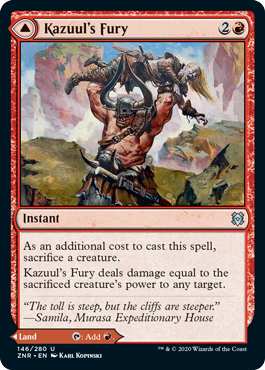
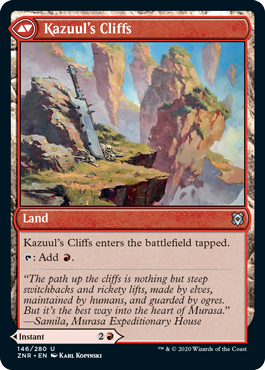
Kazuul's Fury
{2}{R}
Instant
As an additional cost to cast this spell, sacrifice a creature.
Kazuul's Fury deals damage equal to the sacrificed creature's power to any target.
/////
Kazuul's Cliffs
Land
Kazuul's Cliffs enters the battlefield tapped.
{T}: Add {R}.
- The sacrificed creature's last known existence on the battlefield is checked to determine its power.
- You must sacrifice exactly one creature to cast Kazuul's Fury; you can't cast it without sacrificing a creature, and you can't sacrifice additional creatures.
- Players can respond only once this spell has been cast and all its costs have been paid. No one can try to interfere with the creature you sacrificed to prevent you from casting this spell.
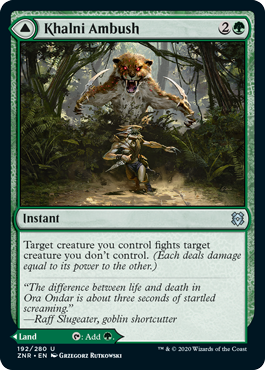
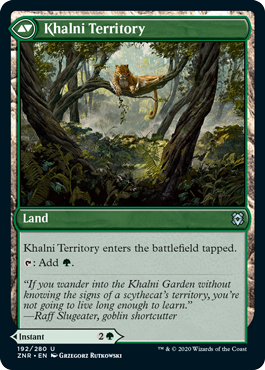
Khalni Ambush
{2}{G}
Instant
Target creature you control fights target creature you don't control. (Each deals damage equal to its power to the other.)
/////
Khalni Territory
Land
Khalni Territory enters the battlefield tapped.
{T}: Add {G}.
- If either target is an illegal target as Khalni Ambush resolves, no creature will deal or be dealt damage.
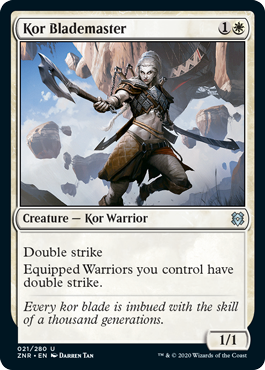
Kor Blademaster
{1}{W}
Creature — Kor Warrior
1/1
Double strike
Equipped Warriors you control have double strike.
- If a creature loses double strike after assigning damage in the first strike combat damage step (due to Kor Blademaster leaving the battlefield, for example), that creature won't assign damage in the normal combat damage step.
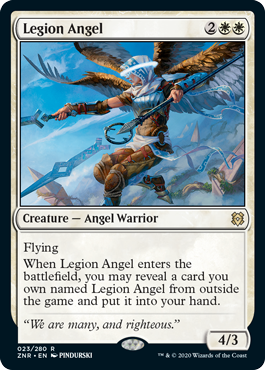
Legion Angel
{2}{W}{W}
Creature — Angel Warrior
4/3
Flying
When Legion Angel enters the battlefield, you may reveal a card you own named Legion Angel from outside the game and put it into your hand.
- In a casual game, a card you choose from outside the game comes from your personal collection. In a tournament event, a card you choose from outside the game must come from your sideboard. You may look at your sideboard any time.
- In a casual game, you may find a Legion Angel outside the game even if your deck contains already four copies of Legion Angel. In a Constructed tournament event, you can't have more than four copies of Legion Angel between your deck and sideboard.
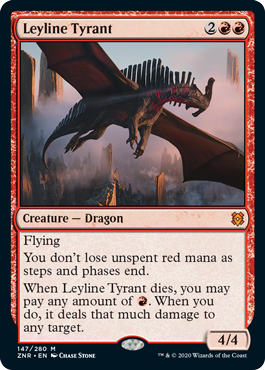
Leyline Tyrant
{2}{R}{R}
Creature — Dragon
4/4
Flying
You don't lose unspent red mana as steps and phases end.
When Leyline Tyrant dies, you may pay any amount of {R}. When you do, it deals that much damage to any target.
- You can keep red mana in your mana pool indefinitely while Leyline Tyrant is on the battlefield. That means if you add a red mana to your mana pool during one step or phase, you can spend it during a later step or phase, or even a later turn. Other types of mana will continue to empty from your mana pool as each step and phase ends.
- If a red mana you add to your mana pool has certain restrictions or riders associated with it (for example, if it was produced by Base Camp), they'll apply to that mana no matter when you spend it.
- Once Leyline Tyrant leaves the battlefield, you have until the end of the current step or phase to spend whatever red mana is in your mana pool before it empties as normal. There is no penalty associated with this other than the loss of the mana.
- Leyline Tyrant's last ability goes on the stack without a target. While that ability is resolving, you may pay any amount of red mana, including from the unspent mana you have. If you do, a second ability triggers and you pick one target to be dealt that much damage. This is different from abilities that say "If you do . . ." in that players may cast spells and activate abilities after mana is paid but before the damage is dealt.
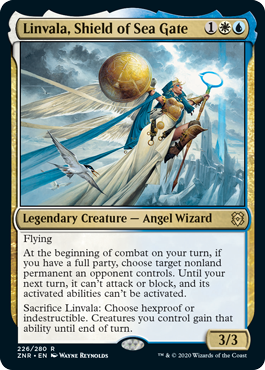
Linvala, Shield of Sea Gate
{1}{W}{U}
Legendary Creature — Angel Wizard
3/3
Flying
At the beginning of combat on your turn, if you have a full party, choose target nonland permanent an opponent controls. Until your next turn, it can't attack or block, and its activated abilities can't be activated.
Sacrifice Linvala: Choose hexproof or indestructible. Creatures you control gain that ability until end of turn.
- Linvala's middle ability won't trigger at all if you don't have a full party as your combat phase begins. It won't affect the target if you don't have a full party as it resolves. The number of creatures in your party may change between these times, however.
- The nonland permanent remains affected until your next turn even if the number of creatures in your party changes or Linvala leaves the battlefield.
- Activated abilities contain a colon. They're generally written "[Cost]: [Effect]." Some keyword abilities (such as equip) are activated abilities and will have a colon in their reminder text. Triggered abilities (starting with "when," "whenever," or "at") are unaffected.
- No abilities of the affected permanent can be activated, including mana abilities.
- In a multiplayer game, if you leave the game after Linvala's middle ability resolves but before your next turn begins, its effect lasts until your next turn would have begun. It neither expires immediately nor lasts indefinitely.
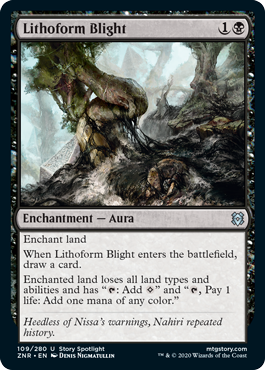
Lithoform Blight
{1}{B}
Enchantment — Aura
Enchant land
When Lithoform Blight enters the battlefield, draw a card.
Enchanted land loses all land types and abilities and has "{T}: Add {C}" and "{T}, Pay 1 life: Add one mana of any color."
- If the target land is an illegal target by the time Lithoform Blight tries to resolve, the spell doesn't resolve. It doesn't enter the battlefield, so you don't draw a card.
- The enchanted land keeps any other card types (such as artifact) and supertypes (such as basic or legendary) when it loses its land types.
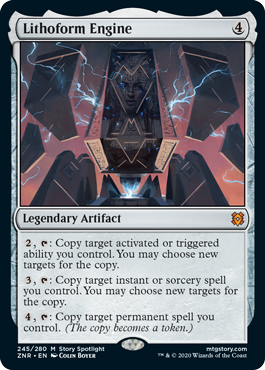
Lithoform Engine
{4}
Legendary Artifact
{2}, {T}: Copy target activated or triggered ability you control. You may choose new targets for the copy.
{3}, {T}: Copy target instant or sorcery spell you control. You may choose new targets for the copy.
{4}, {T}: Copy target permanent spell you control. (The copy becomes a token.)
- The source of the copy from Lithoform Engine's first ability is the same as the source of the original ability.
- Activated abilities contain a colon. They're generally written "[Cost]: [Effect]." Some keyword abilities (such as equip) are activated abilities and will have a colon in their reminder text.
- Triggered abilities use the word "when," "whenever," or "at." They're often written as "[Trigger condition], [effect]." Some keywords (such as prowess) are triggered abilities and will use "when," "whenever," or "at" in their reminder text.
- Lithoform Engine's first ability targets an activated or triggered ability that is on the stack and creates another instance of that ability on the stack. It doesn't cause any object to gain an ability.
- If an ability is linked to a second ability, copies of that first ability are also linked to that second ability. If the second ability refers to "the exiled card," it refers to all cards exiled by the first ability and the copy. For example, if Fiend Hunter's enters-the-battlefield ability is copied and two creatures are exiled, they both return when Fiend Hunter leaves the battlefield.
- Lithoform Engine can copy any spell or ability on the stack, not just one with targets. If a permanent spell is copied, new targets can't be chosen for it, if it has any (perhaps because it's an Aura or a mutating creature spell).
- The copy is created on the stack, so it's not "cast" or "activated." Creating the copy won't cause abilities that trigger when a player casts a spell or activates an ability to trigger. Abilities that say that a triggered ability triggers additional times won't apply to copying a triggered ability.
- The copy will resolve before the original spell or ability does.
- The copy will have the same targets as the spell or ability it's copying unless you choose new ones. You may change any number of the targets, including all of them or none of them. If, for one of the targets, you can't choose a new legal target, then it remains unchanged (even if the current target is illegal).
- If the spell or ability that's copied is modal (that is, it says "Choose one —" or the like), the copy will have the same mode. A different mode can't be chosen. This doesn't apply to copying a permanent spell with a modal enters-the-battlefield triggered ability, but it does apply to copying that ability.
- If the spell or ability that's copied has an X whose value was determined as it was cast or activated, the copy will have the same value of X.
- If the spell or ability has damage divided as it was put onto the stack, the division can't be changed, although the targets receiving that damage still can. The same is true of spells and abilities that distribute counters.
- You can't choose to pay any alternative or additional costs for the copy. However, effects based on any alternative or additional costs that were paid for the original spell are copied as though those same costs were paid for the copy. Most notably, if the original spell was kicked, the copy is kicked.
- Any choices made when the spell or ability resolves won't have been made yet when it's copied. Any such choices will be made separately when the copy resolves. Most notably, if a triggered ability asks you to pay a cost (such as that of Leyline Tyrant), you pay that cost for the copy if you wish to have it paid.
- If a permanent spell is copied, it's put onto the battlefield as a token as the spell resolves rather than putting the copy of the spell onto the battlefield. The rules that apply to a permanent spell becoming a permanent apply to a copy of a spell becoming a token.
- The token that a resolving copy of a spell becomes isn't said to have been "created."
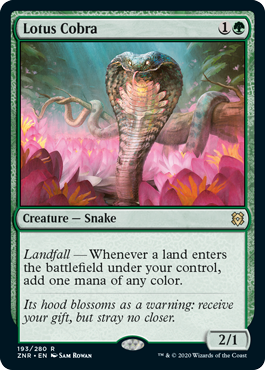
Lotus Cobra
{1}{G}
Creature — Snake
2/1
Landfall — Whenever a land enters the battlefield under your control, add one mana of any color.
- Lotus Cobra's ability uses the stack and players may respond to it. It isn't a mana ability because the event that causes it to trigger isn't a mana ability.
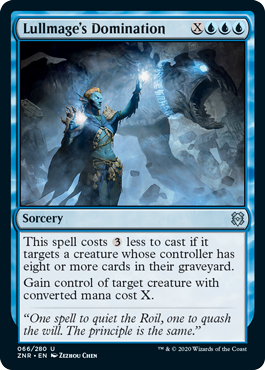
Lullmage's Domination
{X}{U}{U}{U}
Sorcery
This spell costs {3} less to cast if it targets a creature whose controller has eight or more cards in their graveyard.
Gain control of target creature with converted mana cost X.
- To cast Lullmage's Domination, choose a value of X, choose a creature with the appropriate converted mana cost, then determine the spell's cost, subtracting {3} if appropriate. This can't reduce the {U}{U}{U} in the spell's cost. For example, if you wish to target a creature with converted mana cost 2 whose controller has eight cards in their graveyard, you'll pay {U}{U}{U}.
- If a creature on the battlefield has {X} in its mana cost, X is considered to be 0.
- Once Lullmage's Domination resolves, the control effect lasts until the creature leaves the battlefield or you lose the game. It doesn't expire at the end of turn.
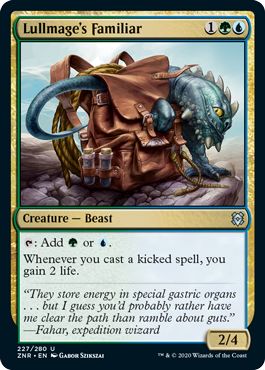
Lullmage's Familiar
{1}{G}{U}
Creature — Beast
2/4
{T}: Add {G} or {U}.
Whenever you cast a kicked spell, you gain 2 life.
- The last ability of Lullmage's Familiar triggers when you cast a kicked spell even if you didn't spend mana from its first ability to cast that spell.
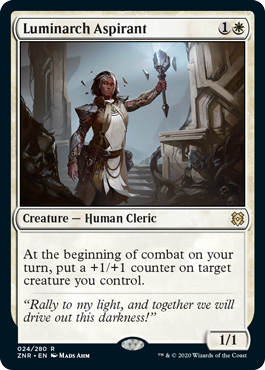
Luminarch Aspirant
{1}{W}
Creature — Human Cleric
1/1
At the beginning of combat on your turn, put a +1/+1 counter on target creature you control.
- Luminarch Aspirant can be the target of its own ability.
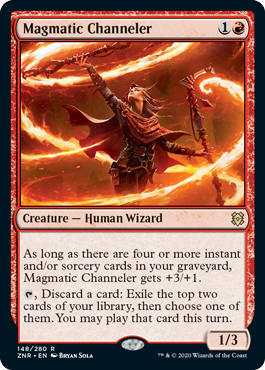
Magmatic Channeler
{1}{R}
Creature — Human Wizard
1/3
As long as there are four or more instant and/or sorcery cards in your graveyard, Magmatic Channeler gets +3/+1.
{T}, Discard a card: Exile the top two cards of your library, then choose one of them. You may play that card this turn.
- Magmatic Channeler gets just +3/+1 from its first ability, no matter how many instant and sorcery cards are in your graveyard beyond the fourth.
- You choose which card you'll be allowed to play this turn while Magmatic Channeler's ability is resolving, but you must follow the normal timing permissions and restrictions for the card when you play it. If it's a land, you can't play it unless you have land plays available.
- You'll still pay all costs for a spell cast this way, including additional costs. You may also pay alternative costs if any are available.
- If you don't play the exiled card you chose, it remains exiled. The card you didn't choose remains exiled whether you play the chosen card or not.
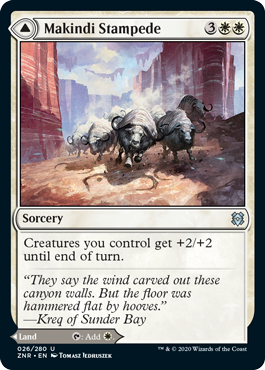
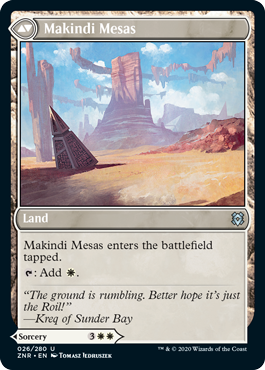
Makindi Stampede
{3}{W}{W}
Sorcery
Creatures you control get +2/+2 until end of turn.
/////
Makindi Mesas
Land
Makindi Mesas enters the battlefield tapped.
{T}: Add {W}.
- Makindi Stampede affects only creatures you control at the time it resolves. Creatures you begin to control later in the turn won't get +2/+2.
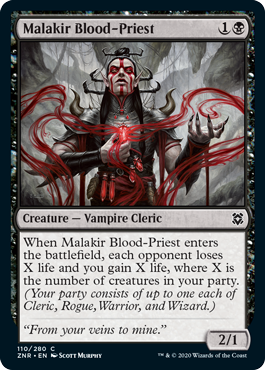
Malakir Blood-Priest
{1}{B}
Creature — Vampire Cleric
2/1
When Malakir Blood-Priest enters the battlefield, each opponent loses X life and you gain X life, where X is the number of creatures in your party. (Your party consists of up to one each of Cleric, Rogue, Warrior, and Wizard.)
- In a Two-Headed Giant game, Malakir Blood-Priest's ability causes the opposing team to lose twice X life and you to gain X life.
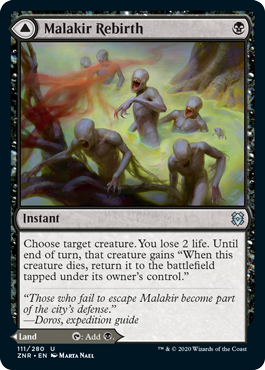
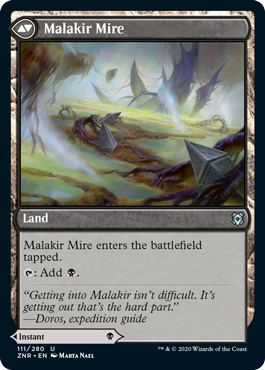
Malakir Rebirth
{B}
Instant
Choose target creature. You lose 2 life. Until end of turn, that creature gains "When this creature dies, return it to the battlefield tapped under its owner's control."
/////
Malakir Mire
Land
Malakir Mire enters the battlefield tapped.
{T}: Add {B}.
- If the target creature is an illegal target by the time Malakir Rebirth tries to resolve, the spell doesn't resolve. You don't lose 2 life.
- Malakir Rebirth's effect works only once. If the targeted creature dies and is then returned to the battlefield, it's considered to be a new creature. If that new creature dies, it won't come back.

Marauding Blight-Priest
{2}{B}
Creature — Vampire Cleric
3/2
Whenever you gain life, each opponent loses 1 life.
- In a Two-Headed Giant game, Marauding Blight-Priest's ability causes the opposing team to lose 2 life.
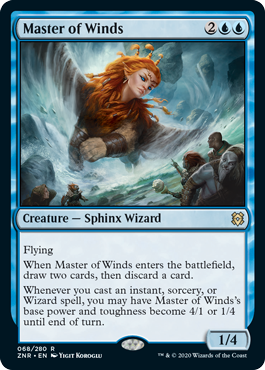
Master of Winds
{2}{U}{U}
Creature — Sphinx Wizard
1/4
Flying
When Master of Winds enters the battlefield, draw two cards, then discard a card.
Whenever you cast an instant, sorcery, or Wizard spell, you may have Master of Winds's base power and toughness become 4/1 or 1/4 until end of turn.
- You don't choose a power and toughness for Master of Winds as its ability triggers. Rather, as it resolves, you choose whether to have Master of Winds become 4/1, become 1/4, or not change its power and toughness.
- The ability of Master of Winds overwrites any previous effects that set its power and/or toughness to specific values. Other effects that set these characteristics to specific values that start to apply after the ability resolves will overwrite that part of the effect.
- Effects that modify the power or toughness of Master of Winds without setting it will apply to its new base power and toughness no matter when they started to take effect. The same is true for counters that change its power and toughness.
- Because damage remains marked on a creature until the damage is removed as the turn ends, nonlethal damage dealt to Master of Winds may become lethal if you change its base toughness during that turn.
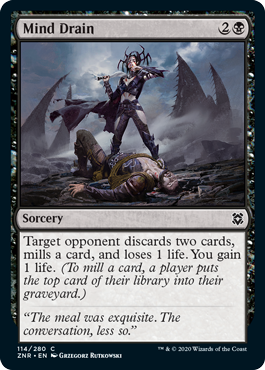
Mind Drain
{2}{B}
Sorcery
Target opponent discards two cards, mills a card, and loses 1 life. You gain 1 life. (To mill a card, a player puts the top card of their library into their graveyard.)
- If the target opponent can discard only one card or can't discard any cards, they still mill a card and lose 1 life, and you gain 1 life.
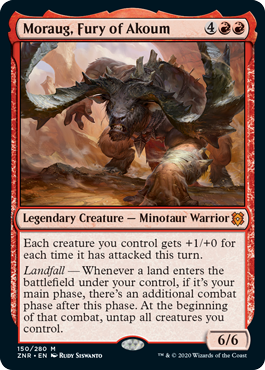
Moraug, Fury of Akoum
{4}{R}{R}
Legendary Creature — Minotaur Warrior
6/6
Each creature you control gets +1/+0 for each time it has attacked this turn.
Landfall — Whenever a land enters the battlefield under your control, if it's your main phase, there's an additional combat phase after this phase. At the beginning of that combat, untap all creatures you control.
- Moraug's first ability checks each turn how many times each creature has attacked. It counts times that creature attacked before Moraug was on the battlefield, and it stops applying if Moraug leaves the battlefield.
- Moraug's first ability counts how many times a creature has attacked, not how many times it has dealt damage. The first time a creature attacks in a turn, the +1/+0 bonus will apply to the combat damage it deals during that combat.
- A creature that enters the battlefield attacking hasn't attacked that combat. Moraug's ability won't count that combat. Unless that creature has haste, it won't be able to attack in additional combats this turn.
- If the landfall ability resolves during your precombat main phase, the additional combat phase will happen before your regular combat phase. You'll untap creatures you control at the beginning of the additional combat but not at the beginning of your regular combat.
- There won't be an additional main phase after the additional combat phase. For example, if the landfall ability resolves twice during your postcombat main phase, you'll get two consecutive additional combat phases after your main phase (untapping your creatures at the beginning of each), followed by your ending phase.
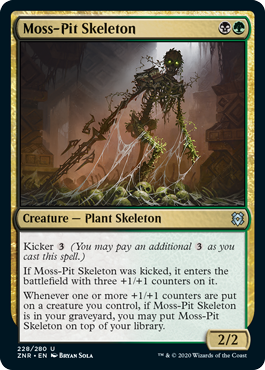
Moss-Pit Skeleton
{B}{G}
Creature — Plant Skeleton
2/2
Kicker {3} (You may pay an additional {3} as you cast this spell.)
If Moss-Pit Skeleton was kicked, it enters the battlefield with three +1/+1 counters on it.
Whenever one or more +1/+1 counters are put on a creature you control, if Moss-Pit Skeleton is in your graveyard, you may put Moss-Pit Skeleton on top of your library.
- Moss-Pit Skeleton's last ability triggers only if it's already in your graveyard as +1/+1 counters are put onto a creature you control.
- Moss-Pit Skeleton's last ability triggers if a creature enters the battlefield under your control with +1/+1 counters on it, as well as when +1/+1 counters are put on a creature you already control.
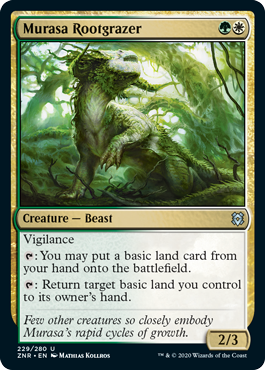
Murasa Rootgrazer
{G}{W}
Creature — Beast
2/3
Vigilance
{T}: You may put a basic land card from your hand onto the battlefield.
{T}: Return target basic land you control to its owner's hand.
- Murasa Rootgrazer's middle ability doesn't count as playing a land. It can put a land card onto the battlefield even if you've already played your land for the turn.
- Once Murasa Rootgrazer has attacked, you can activate either of its activated abilities. Doing so doesn't remove it from combat. It remains an attacking creature and will deal and receive combat damage as normal.
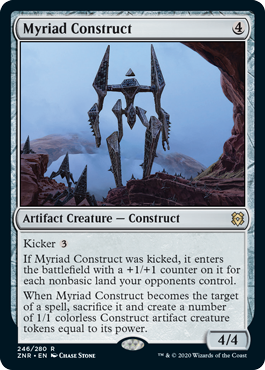
Myriad Construct
{4}
Artifact Creature — Construct
4/4
Kicker {3}
If Myriad Construct was kicked, it enters the battlefield with a +1/+1 counter on it for each nonbasic land your opponents control.
When Myriad Construct becomes the target of a spell, sacrifice it and create a number of 1/1 colorless Construct artifact creature tokens equal to its power.
- An ability that triggers when a permanent becomes the target of a spell resolves before the spell that caused it to trigger. It resolves even if that spell is countered.
- If you don't sacrifice Myriad Construct as its last ability resolves (perhaps because its ability triggered more than once and you've already sacrificed it), you still create Construct tokens. The number of tokens you create is determined by Myriad Construct's power as it last existed on the battlefield.
- If a spell targets Myriad Construct more than once, its last ability triggers only once.
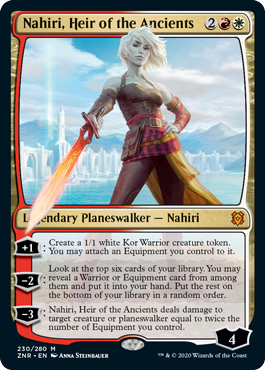
Nahiri, Heir of the Ancients
{2}{R}{W}
Legendary Planeswalker — Nahiri
4
+1: Create a 1/1 white Kor Warrior creature token. You may attach an Equipment you control to it.
−2: Look at the top six cards of your library. You may reveal a Warrior or Equipment card from among them and put it into your hand. Put the rest on the bottom of your library in a random order.
−3: Nahiri, Heir of the Ancients deals damage to target creature or planeswalker equal to twice the number of Equipment you control.
- You create a Kor Warrior token and attach an Equipment to it if you wish all while Nahiri's first ability is resolving. Nothing can happen in between, and no player may choose to take actions.
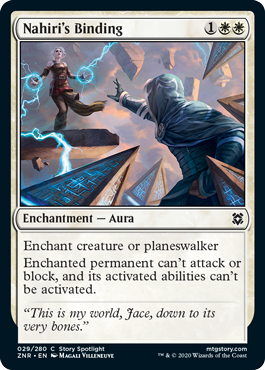
Nahiri's Binding
{1}{W}{W}
Enchantment — Aura
Enchant creature or planeswalker
Enchanted permanent can't attack or block, and its activated abilities can't be activated.
- Activated abilities contain a colon. They're generally written "[Cost]: [Effect]." Some keyword abilities are activated abilities and will have a colon in their reminder text. Triggered abilities (starting with "when," "whenever," or "at") are unaffected.
- No abilities of the enchanted permanent can be activated, including mana abilities.
- A planeswalker enchanted this way may be attacked.
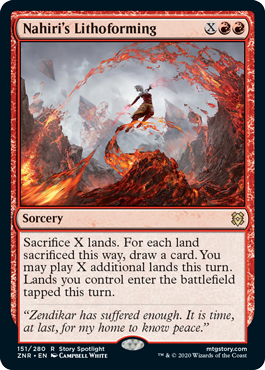
Nahiri's Lithoforming
{X}{R}{R}
Sorcery
Sacrifice X lands. For each land sacrificed this way, draw a card. You may play X additional lands this turn. Lands you control enter the battlefield tapped this turn.
- You don't sacrifice lands until Nahiri's Lithoforming is resolving. Once you do so, players can't take actions until the spell has finished resolving.
- If X is greater than the number of lands you control, you sacrifice each land you control. The number of cards you draw is less than X, but you're allowed to play X additional lands.
- Nahiri's Lithoforming's permission to play lands is cumulative with other effects that allow you to play additional lands, such as that of Scale the Heights.
- If an effect says that a land enters tapped unless a condition is met or a cost is paid, that land enters tapped even if that condition is met or that cost is paid if it's affected by Nahiri's Lithoforming.
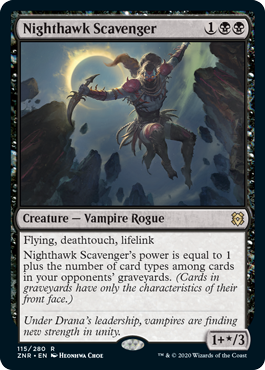
Nighthawk Scavenger
{1}{B}{B}
Creature — Vampire Rogue
1+*/3
Flying, deathtouch, lifelink
Nighthawk Scavenger's power is equal to 1 plus the number of card types among cards in your opponents' graveyards. (Cards in graveyards have only the characteristics of their front face.)
- The ability that defines Nighthawk Scavenger's power applies in all zones, not just the battlefield.
- Nighthawk Scavenger counts card types, not cards. If the only card in your opponents' graveyards is a single artifact creature card, Nighthawk Scavenger will be 3/3. If the only cards in those graveyards are ten artifact cards and ten creature cards, Nighthawk Scavenger will still be 3/3.
- Card types that can appear on cards in a graveyard include artifact, creature, enchantment, instant, land, planeswalker, and sorcery. Legendary, basic, and snow are supertypes, not card types; Vampire and Rogue are subtypes, not card types.
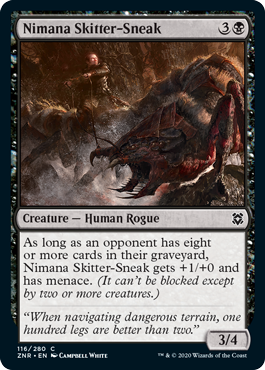
Nimana Skitter-Sneak
{3}{B}
Creature — Human Rogue
3/4
As long as an opponent has eight or more cards in their graveyard, Nimana Skitter-Sneak gets +1/+0 and has menace. (It can't be blocked except by two or more creatures.)
- Once a single creature has blocked Nimana Skitter-Sneak, causing it to gain menace won't cause it to become unblocked or remove that blocking creature from combat.
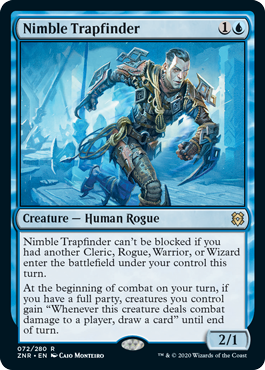
Nimble Trapfinder
{1}{U}
Creature — Human Rogue
2/1
Nimble Trapfinder can't be blocked if you had another Cleric, Rogue, Warrior, or Wizard enter the battlefield under your control this turn.
At the beginning of combat on your turn, if you have a full party, creatures you control gain "Whenever this creature deals combat damage to a player, draw a card" until end of turn.
- Nimble Trapfinder's first ability checks only whether a permanent entered the battlefield under your control earlier in the turn and had one of the party creature types as it entered. It doesn't apply if an entering object gained the type later in the turn. It does apply if the entering object left your control since. It doesn't matter whether Nimble Trapfinder was under your control as that object entered.
- Nimble Trapfinder's second ability affects only creatures you control at the time it resolves. Creatures you begin to control later in the turn won't get the triggered ability.
- After Nimble Trapfinder's second ability has resolved, creatures you control keep the triggered ability for the turn even if you no longer have a full party later in the turn.
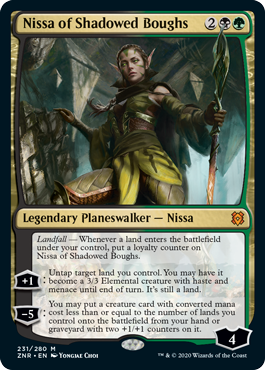
Nissa of Shadowed Boughs
{2}{B}{G}
Legendary Planeswalker — Nissa
4
Landfall — Whenever a land enters the battlefield under your control, put a loyalty counter on Nissa of Shadowed Boughs.
+1: Untap target land you control. You may have it become a 3/3 Elemental creature with haste and menace until end of turn. It's still a land.
−5: You may put a creature card with converted mana cost less than or equal to the number of lands you control onto the battlefield from your hand or graveyard with two +1/+1 counters on it.
- Nissa's middle ability can target a land that's already untapped or that's already a creature.
- Nissa's middle ability doesn't remove any abilities the land creature has.
- Nissa's middle ability overwrites any previous effects that set the land creature's power and/or toughness to specific values. Other effects that set these characteristics to specific values that start to apply after the ability resolves will overwrite that part of the effect.
- Effects that modify the power or toughness of the land creature without setting it will apply to its new base power and toughness no matter when they started to take effect. The same is true for counters that change its power and toughness.
- If a card in a player's hand or graveyard has {X} in its mana cost, X is considered to be 0.
- The creature card's converted mana cost is checked only in your hand or graveyard. You may put a creature card onto the battlefield whose converted mana cost becomes greater than the number of lands you control once it's on the battlefield, most likely because it enters as a copy of another permanent.
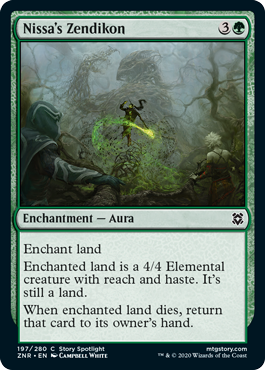
Nissa's Zendikon
{3}{G}
Enchantment — Aura
Enchant land
Enchanted land is a 4/4 Elemental creature with reach and haste. It's still a land.
When enchanted land dies, return that card to its owner's hand.
- Nissa's Zendikon doesn't remove any abilities the land creature has.
- Nissa's Zendikon overwrites any previous effects that set the land creature's power and/or toughness to specific values. Other effects that set these characteristics to specific values that start to apply after the ability resolves will overwrite that part of the effect.
- Effects that modify the power or toughness of the land creature without setting it will apply to its new base power and toughness no matter when they started to take effect. The same is true for counters that change its power and toughness.
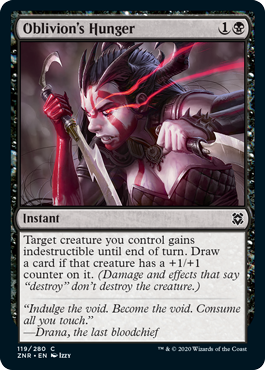
Oblivion's Hunger
{1}{B}
Instant
Target creature you control gains indestructible until end of turn. Draw a card if that creature has a +1/+1 counter on it. (Damage and effects that say "destroy" don't destroy the creature.)
- If the target creature is an illegal target by the time Oblivion's Hunger tries to resolve, the spell doesn't resolve. You don't draw a card if the target has or had a +1/+1 counter on it.
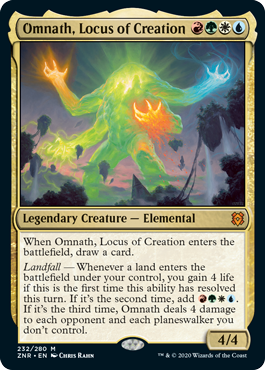
Omnath, Locus of Creation
{R}{G}{W}{U}
Legendary Creature — Elemental
4/4
When Omnath, Locus of Creation enters the battlefield, draw a card.
Landfall — Whenever a land enters the battlefield under your control, you gain 4 life if this is the first time this ability has resolved this turn. If it's the second time, add {R}{G}{W}{U}. If it's the third time, Omnath deals 4 damage to each opponent and each planeswalker you don't control.
- Omnath's landfall ability has no effect each time beyond the third it resolves in a turn.
- Omnath's landfall ability always uses the stack and players may respond to it. It isn't a mana ability because the event that causes it to trigger isn't a mana ability, even if it's the second time the ability has resolved in a turn.
- In a Two-Headed Giant game, Omnath's second ability causes the opposing team to lose 8 life the third time it resolves. Each other player's planeswalkers—including your teammate's—are dealt 4 damage.
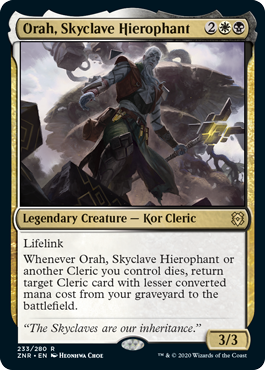
Orah, Skyclave Hierophant
{2}{W}{B}
Legendary Creature — Kor Cleric
3/3
Lifelink
Whenever Orah, Skyclave Hierophant or another Cleric you control dies, return target Cleric card with lesser converted mana cost from your graveyard to the battlefield.
- If another Cleric you control dies at the same time as Orah, Orah's ability triggers for that Cleric in addition to triggering for itself.
- If a creature on the battlefield or a creature card in a graveyard has {X} in its mana cost, X is considered to be 0.
- Orah's ability can target a Cleric card that was put into your graveyard at the same time as the Cleric whose death caused the ability to trigger.
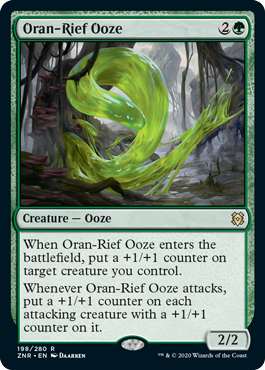
Oran-Rief Ooze
{2}{G}
Creature — Ooze
2/2
When Oran-Rief Ooze enters the battlefield, put a +1/+1 counter on target creature you control.
Whenever Oran-Rief Ooze attacks, put a +1/+1 counter on each attacking creature with a +1/+1 counter on it.
- Oran-Rief Ooze can be the target of its own first ability.
- The group of creatures that receive a +1/+1 counter from Oran-Rief Ooze's second ability is determined only as the ability resolves. Other abilities that trigger on attacking (such as that of Paired Tactician) may add counters to creatures before that ability resolves.
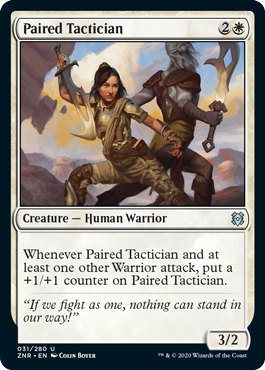
Paired Tactician
{2}{W}
Creature — Human Warrior
3/2
Whenever Paired Tactician and at least one other Warrior attack, put a +1/+1 counter on Paired Tactician.
- Paired Tactician gets just one +1/+1 counter from its ability, no matter how many Warriors attack with it beyond the first.
- The other attacking Warrior doesn't have to be attacking the same player or planeswalker as Paired Tactician.
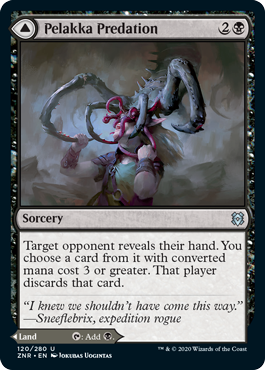
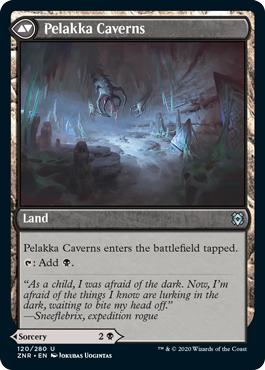
Pelakka Predation
{2}{B}
Sorcery
Target opponent reveals their hand. You choose a card from it with converted mana cost 3 or greater. That player discards that card.
/////
Pelakka Caverns
Land
Pelakka Caverns enters the battlefield tapped.
{T}: Add {B}.
- If a card in a player's hand has {X} in its mana cost, X is considered to be 0.
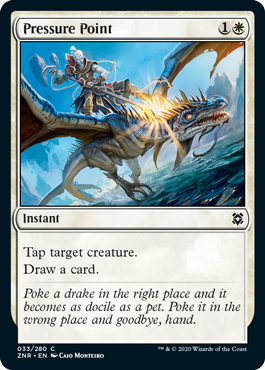
Pressure Point
{1}{W}
Instant
Tap target creature.
Draw a card.
- If the target creature is an illegal target by the time Pressure Point tries to resolve, the spell doesn't resolve. You don't draw a card. If the target is legal but doesn't become tapped (most likely because it's already tapped), you do draw a card.
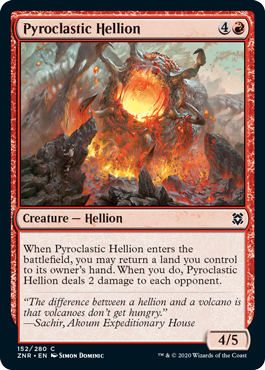
Pyroclastic Hellion
{4}{R}
Creature — Hellion
4/5
When Pyroclastic Hellion enters the battlefield, you may return a land you control to its owner's hand. When you do, Pyroclastic Hellion deals 2 damage to each opponent.
- While resolving Pyroclastic Hellion's ability, you can't return more than one land to have it deal more damage.
- In a Two-Headed Giant game, Pyroclastic Hellion's ability causes the opposing team to lose 4 life.
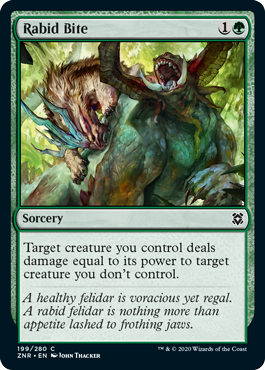
Rabid Bite
{1}{G}
Sorcery
Target creature you control deals damage equal to its power to target creature you don't control.
- If either creature is an illegal target as Rabid Bite tries to resolve, the creature you control won't deal damage.
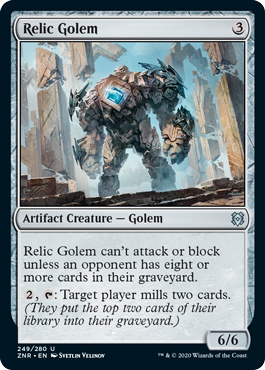
Relic Golem
{3}
Artifact Creature — Golem
6/6
Relic Golem can't attack or block unless an opponent has eight or more cards in their graveyard.
{2}, {T}: Target player mills two cards. (They put the top two cards of their library into their graveyard.)
- Once Relic Golem has attacked, causing its first ability to apply by removing cards from graveyards won't cause Relic Golem to be removed from combat.
- Similarly, once Relic Golem has blocked an attacking creature, causing its first ability to apply won't cause that attacking creature to become unblocked or remove Relic Golem from combat.
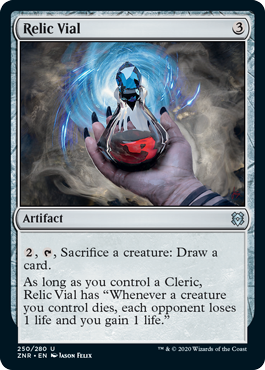
Relic Vial
{3}
Artifact
{2}, {T}, Sacrifice a creature: Draw a card.
As long as you control a Cleric, Relic Vial has "Whenever a creature you control dies, each opponent loses 1 life and you gain 1 life."
- Once Relic Vial's ability has triggered, that ability resolves even if you no longer control a Cleric.
- If you sacrifice the only Cleric you control to activate Relic Vial's first ability, the triggered ability it gives itself triggers.
- If Relic Vial leaves the battlefield at the same time as each Cleric you control, the triggered ability triggers for any creatures you control that die at the same time (possibly including those Clerics).
- In a Two-Headed Giant game, Relic Vial's ability causes the opposing team to lose 2 life and you to gain 1 life.
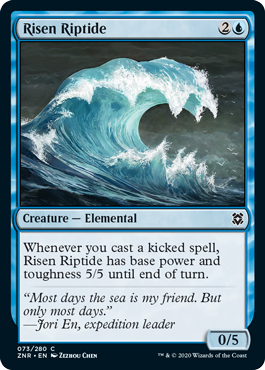
Risen Riptide
{2}{U}
Creature — Elemental
0/5
Whenever you cast a kicked spell, Risen Riptide has base power and toughness 5/5 until end of turn.
- Risen Riptide's ability overwrites any previous effects that set its power and/or toughness to specific values. Other effects that set these characteristics to specific values that start to apply after the ability resolves will overwrite that part of the effect.
- Effects that modify Risen Riptide's power or toughness without setting it will apply to its new base power and toughness no matter when they started to take effect. The same is true for counters that change the creature's power or toughness.
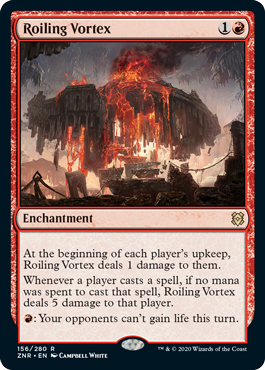
Roiling Vortex
{1}{R}
Enchantment
At the beginning of each player's upkeep, Roiling Vortex deals 1 damage to them.
Whenever a player casts a spell, if no mana was spent to cast that spell, Roiling Vortex deals 5 damage to that player.
{R}: Your opponents can't gain life this turn.
- An ability that triggers when a player casts a spell resolves before the spell that caused it to trigger. It resolves even if that spell is countered.
- Activating Roiling Vortex's last ability won't undo any life gained before it resolved.
- In a Two-Headed Giant game, Roiling Vortex's first ability triggers twice during each team's upkeep. Each instance deals 1 damage to one of the players on that team.
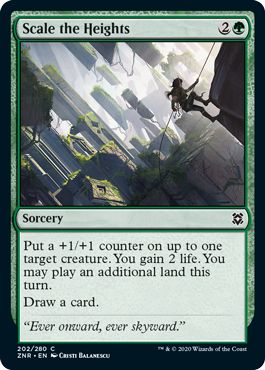
Scale the Heights
{2}{G}
Sorcery
Put a +1/+1 counter on up to one target creature. You gain 2 life. You may play an additional land this turn.
Draw a card.
- If you choose a target creature and it's an illegal target by the time Scale the Heights tries to resolve, the spell doesn't resolve. You don't gain life, draw a card, or get to play an additional land.
- The permission to play lands is cumulative with other effects that allow you to play additional lands, such as that of Nahiri's Lithoforming.
- You don't play a land as Scale the Heights resolves; Scale the Heights fully resolves first and you draw a card, perhaps including a land you'll play later. If it's not your turn, you won't be able to play a land this turn at all.
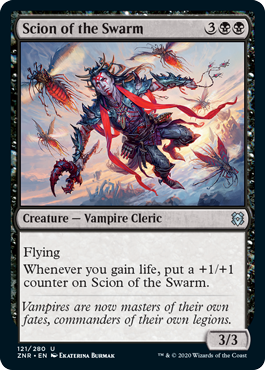
Scion of the Swarm
{3}{B}{B}
Creature — Vampire Cleric
3/3
Flying
Whenever you gain life, put a +1/+1 counter on Scion of the Swarm.
- If you gain life at the same time Scion of the Swarm is dealt lethal damage, it dies before its ability can put a +1/+1 counter on it.
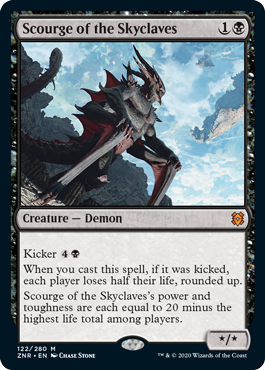
Scourge of the Skyclaves
{1}{B}
Creature — Demon
*/*
Kicker {4}{B}
When you cast this spell, if it was kicked, each player loses half their life, rounded up.
Scourge of the Skyclaves's power and toughness are each equal to 20 minus the highest life total among players.
- The ability that defines Scourge of the Skyclaves's power and toughness applies in all zones, not just the battlefield.
- If the highest life total among players is greater than 20, Scourge of the Skyclaves has negative power and toughness equal to the difference.
- An ability that triggers when a player casts a spell resolves before the spell that caused it to trigger. It resolves even if that spell is countered. Notably, Scourge of the Skyclaves may have its toughness change from less than 0 to greater than 0 as a result of its triggered ability before it resolves and enters the battlefield.
- In a Two-Headed Giant game, Scourge of the Skyclaves causes each team to lose twice half their life rounded up, which is their full life total or, if it's odd, that much life plus 1. This causes the game to end in a draw.
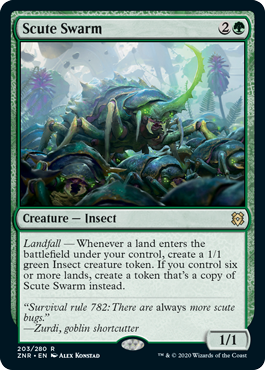
Scute Swarm
{2}{G}
Creature — Insect
1/1
Landfall — Whenever a land enters the battlefield under your control, create a 1/1 green Insect creature token. If you control six or more lands, create a token that's a copy of Scute Swarm instead.
- The token copy will have Scute Swarm's ability. It will also be able to create copies of itself.
- The token copy won't copy counters or damage marked on Scute Swarm, nor will it copy other effects that have changed Scute Swarm's power, toughness, types, color, and so on. Normally, this means the token will simply be a Scute Swarm, but if any copy effects have affected the original Scute Swarm, the token will take those into account.
- If Scute Swarm leaves the battlefield before its triggered ability resolves, the token will still enter the battlefield as a copy of Scute Swarm, using Scute Swarm's copiable values from when it was last on the battlefield.
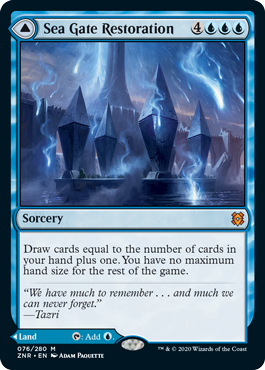
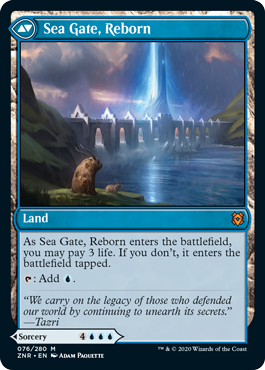
Sea Gate Restoration
{4}{U}{U}{U}
Sorcery
Draw cards equal to the number of cards in your hand plus one. You have no maximum hand size for the rest of the game.
/////
Sea Gate, Reborn
Land
As Sea Gate, Reborn enters the battlefield, you may pay 3 life. If you don't, it enters the battlefield tapped.
{T}: Add {U}.
- If you have no cards in hand as Sea Gate Restoration resolves, you draw one card.
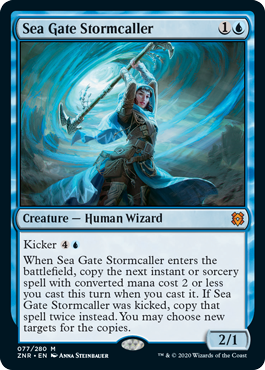
Sea Gate Stormcaller
{1}{U}
Creature — Human Wizard
2/1
Kicker {4}{U}
When Sea Gate Stormcaller enters the battlefield, copy the next instant or sorcery spell with converted mana cost 2 or less you cast this turn when you cast it. If Sea Gate Stormcaller was kicked, copy that spell twice instead. You may choose new targets for the copies.
- Sea Gate Stormcaller's delayed triggered ability will copy any instant or sorcery spell, not just one with targets.
- A copy is created even if Sea Gate Stormcaller leaves the battlefield before its delayed triggered ability is created.
- A copy is created even if the spell that caused Sea Gate Stormcaller's delayed triggered ability to trigger has been countered by the time that ability resolves. The copy resolves before the original spell.
- The copy will have the same targets as the spell it's copying unless you choose new ones. You may change any number of the targets, including all of them or none of them. The new targets must be legal.
- If the spell that's copied is modal (that is, it says "Choose one —" or the like), the copy will have the same mode or modes. You can't choose different ones.
- For spells with {X} in their mana costs, use the value chosen for X to determine the spell's converted mana cost. If it's copied, the copy has the same value of X.
- You can't choose to pay any additional costs for the copy. However, effects based on any additional costs that were paid for the original spell are copied as though those same costs were paid for the copy too. Notably, if the spell you copy was kicked, the copy or copies will also be kicked.
- The copy is created on the stack, so it's not "cast." Abilities that trigger when a player casts a spell won't trigger.
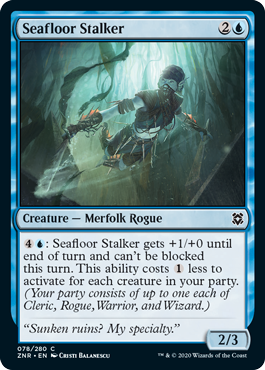
Seafloor Stalker
{2}{U}
Creature — Merfolk Rogue
2/3
{4}{U}: Seafloor Stalker gets +1/+0 until end of turn and can't be blocked this turn. This ability costs {1} less to activate for each creature in your party. (Your party consists of up to one each of Cleric, Rogue, Warrior, and Wizard.)
- Once a creature has blocked Seafloor Stalker, activating its ability won't cause it to become unblocked or remove that blocking creature from combat.
- You can activate Seafloor Stalker's ability more than once, even if it already can't be blocked this turn.
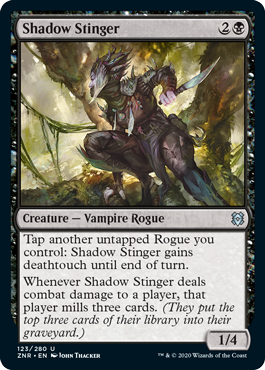
Shadow Stinger
{2}{B}
Creature — Vampire Rogue
1/4
Tap another untapped Rogue you control: Shadow Stinger gains deathtouch until end of turn.
Whenever Shadow Stinger deals combat damage to a player, that player mills three cards. (They put the top three cards of their library into their graveyard.)
- You can tap any other untapped Rogue you control, including one you haven't controlled continuously since the beginning of your most recent turn, to pay the cost of Shadow Stinger's first ability.
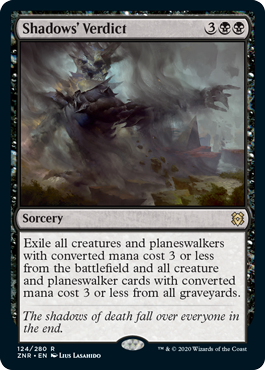
Shadows' Verdict
{3}{B}{B}
Sorcery
Exile all creatures and planeswalkers with converted mana cost 3 or less from the battlefield and all creature and planeswalker cards with converted mana cost 3 or less from all graveyards.
- If a permanent on the battlefield or a card in a graveyard has {X} in its mana cost, X is considered to be 0.
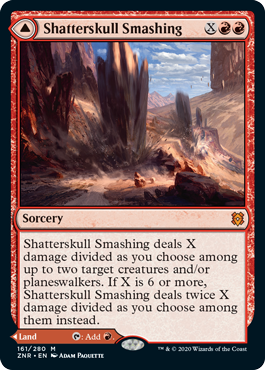
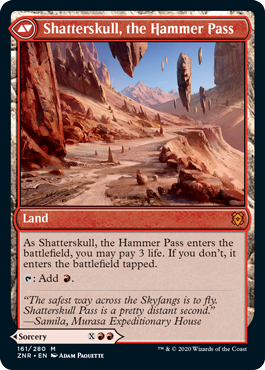
Shatterskull Smashing
{X}{R}{R}
Sorcery
Shatterskull Smashing deals X damage divided as you choose among up to two target creatures and/or planeswalkers. If X is 6 or more, Shatterskull Smashing deals twice X damage divided as you choose among them instead.
/////
Shatterskull, the Hammer Pass
Land
As Shatterskull, the Hammer Pass enters the battlefield, you may pay 3 life. If you don't, it enters the battlefield tapped.
{T}: Add {R}.
- You divide the damage as you cast Shatterskull Smashing, not as it resolves. If you choose two targets, each target must be assigned at least 1 damage.
- If X is 6 or more, you divide twice X damage; you don't assign X damage and then double that damage.
- If one of the targets becomes illegal for Shatterskull Smashing, the original division of damage still applies to the still-legal target, but the damage that would have been dealt to the illegal target isn't dealt at all.
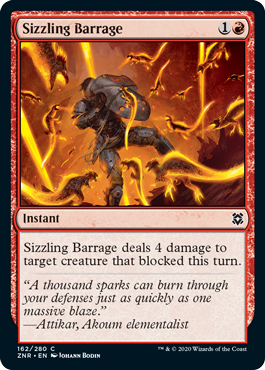
Sizzling Barrage
{1}{R}
Instant
Sizzling Barrage deals 4 damage to target creature that blocked this turn.
- Sizzling Barrage can target a creature that's currently blocking or one that blocked earlier in the turn and is no longer blocking.
- Destroying a blocking creature doesn't cause the creature it was blocking to become unblocked.
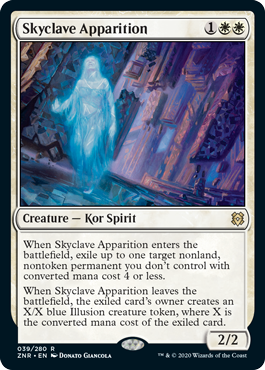
Skyclave Apparition
{1}{W}{W}
Creature — Kor Spirit
2/2
When Skyclave Apparition enters the battlefield, exile up to one target nonland, nontoken permanent you don't control with converted mana cost 4 or less.
When Skyclave Apparition leaves the battlefield, the exiled card's owner creates an X/X blue Illusion creature token, where X is the converted mana cost of the exiled card.
- If a creature on the battlefield has {X} in its mana cost, X is considered to be 0.
- If Skyclave Apparition leaves the battlefield before its first ability resolves, the ability still exiles the target permanent.
- If there's no exiled card when Skyclave Apparition leaves the battlefield (most likely because its first ability hasn't resolved yet), no player creates a token.
- If Skyclave Apparition's first ability exiled more than one card owned by a single player, that player creates a token with power and toughness equal to the sum of those cards' converted mana costs. If the first ability exiled cards owned by more than one player, each of those players creates a token with power and toughness equal to the sum of the converted mana costs of all cards exiled by the first ability.
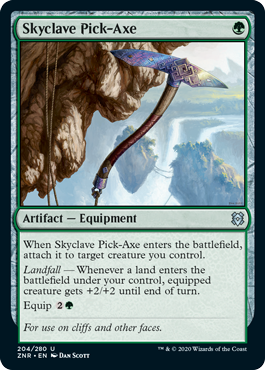
Skyclave Pick-Axe
{G}
Artifact — Equipment
When Skyclave Pick-Axe enters the battlefield, attach it to target creature you control.
Landfall — Whenever a land enters the battlefield under your control, equipped creature gets +2/+2 until end of turn.
Equip {2}{G}
- The bonus from Skyclave Pick-Axe's landfall ability applies to the creature it's attached to at the time the ability resolves. That bonus doesn't apply to a new creature if Skyclave Pick-Axe becomes attached to a new creature.
- If there's no equipped creature as Skyclave Pick-Axe's landfall ability resolves, no creature gets +2/+2.
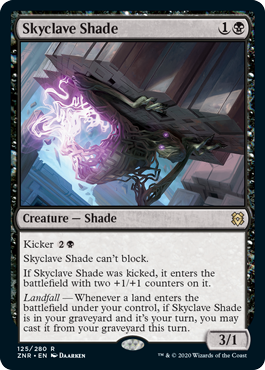
Skyclave Shade
{1}{B}
Creature — Shade
3/1
Kicker {2}{B}
Skyclave Shade can't block.
If Skyclave Shade was kicked, it enters the battlefield with two +1/+1 counters on it.
Landfall — Whenever a land enters the battlefield under your control, if Skyclave Shade is in your graveyard and it's your turn, you may cast it from your graveyard this turn.
- Skyclave Shade's landfall ability triggers only if it's in your graveyard immediately after the land enters the battlefield.
- You must follow the normal timing permissions and restrictions for Skyclave Shade when casting it with the permission of its landfall ability. You must pay its mana cost (or, if another effect allows, an alternative cost). You may pay its kicker cost when casting it this way.
- After you cast Skyclave Shade from your graveyard, it's considered a new object, and the permission from its landfall ability won't apply to it again even if it returns to your graveyard later in the turn. You'll need to have another land enter the battlefield under your control after it has returned to your graveyard to cast it again.
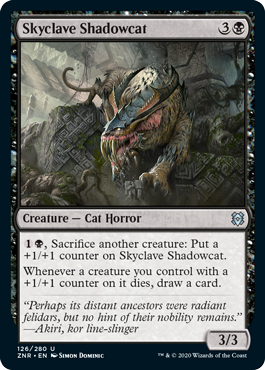
Skyclave Shadowcat
{3}{B}
Creature — Cat Horror
3/3
{1}{B}, Sacrifice another creature: Put a +1/+1 counter on Skyclave Shadowcat.
Whenever a creature you control with a +1/+1 counter on it dies, draw a card.
- If Skyclave Shadowcat has a +1/+1 counter on it and it dies, its last ability triggers.
- If Skyclave Shadowcat dies at the same time as another creature you control with a +1/+1 counter on it, its last ability triggers for that creature.
- You draw just one card each time Skyclave Shadowcat's last ability resolves, no matter how many +1/+1 counters the creature had on it.
- If a creature with a +1/+1 counter on it died due to receiving too many -1/-1 counters, it dies at the same time that the counters are removed, and Skyclave Shadowcat's last ability triggers.
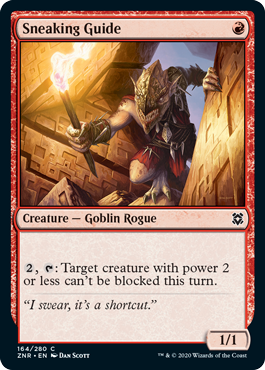
Sneaking Guide
{R}
Creature — Goblin Rogue
1/1
{2}, {T}: Target creature with power 2 or less can't be blocked this turn.
- If the target creature's power is greater than 2 as Sneaking Guide's ability tries to resolve, the ability doesn't resolve. However, if instead the creature's power is raised above 2 after the ability resolves, it still can't be blocked that turn.
- Once a creature with power 2 or less has been blocked, Sneaking Guide's ability won't cause it to become unblocked.
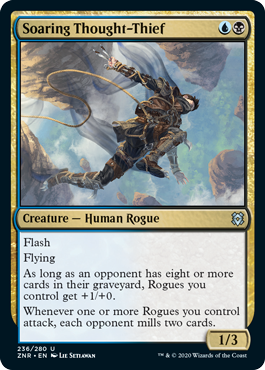
Soaring Thought-Thief
{U}{B}
Creature — Human Rogue
1/3
Flash
Flying
As long as an opponent has eight or more cards in their graveyard, Rogues you control get +1/+0.
Whenever one or more Rogues you control attack, each opponent mills two cards.
- Soaring Thought-Thief's third ability applies to itself as well as other Rogues you control.
- Soaring Thought-Thief's fourth ability causes each opponent to mill two cards, not just those being attacked by Rogues you control.
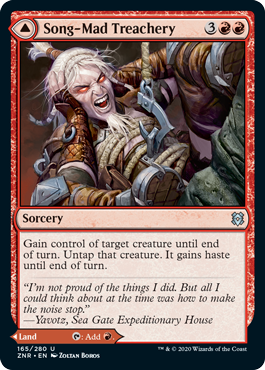
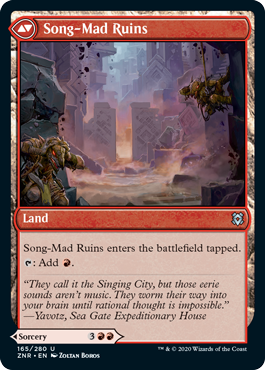
Song-Mad Treachery
{3}{R}{R}
Sorcery
Gain control of target creature until end of turn. Untap that creature. It gains haste until end of turn.
/////
Song-Mad Ruins
Land
Song-Mad Ruins enters the battlefield tapped.
{T}: Add {R}.
- Song-Mad Treachery can target any creature, even one that's untapped or one you already control.
- Gaining control of a creature doesn't cause you to gain control of any Auras or Equipment attached to it.
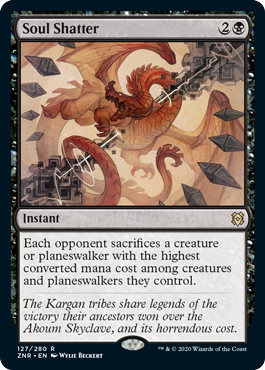
Soul Shatter
{2}{B}
Instant
Each opponent sacrifices a creature or planeswalker with the highest converted mana cost among creatures and planeswalkers they control.
- As Soul Shatter resolves, first the opponent whose turn it is (or the next opponent in turn order, if it's your turn) chooses a creature or planeswalker they control with the highest converted mana cost among that player's creatures and planeswalkers, then each other opponent in turn order does the same, knowing the choices made before them. Then all of the chosen permanents are sacrificed at the same time.
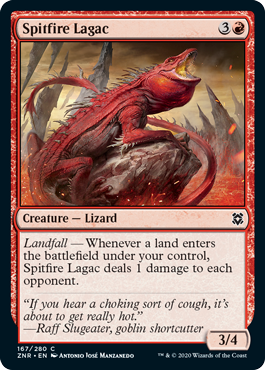
Spitfire Lagac
{3}{R}
Creature — Lizard
3/4
Landfall — Whenever a land enters the battlefield under your control, Spitfire Lagac deals 1 damage to each opponent.
- In a Two-Headed Giant game, Spitfire Lagac's ability causes the opposing team to lose 2 life.
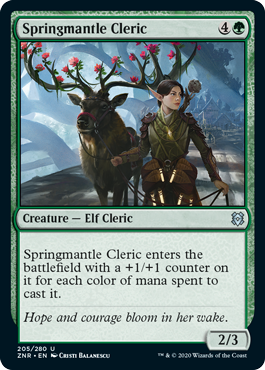
Springmantle Cleric
{4}{G}
Creature — Elf Cleric
2/3
Springmantle Cleric enters the battlefield with a +1/+1 counter on it for each color of mana spent to cast it.
- If an effect allows you to spend mana as though it were mana of any color to cast Springmantle Cleric, you consider only the actual mana spent to determine how many counters it receives.
- Colorless mana won't give Springmantle Cleric another +1/+1 counter. Colorless is not a color.
- If Springmantle Cleric enters the battlefield without being cast, it receives no +1/+1 counters.
- If another creature enters the battlefield as a copy of Springmantle Cleric, consider what mana was spent to cast that creature to determine how many +1/+1 counters it enters with.
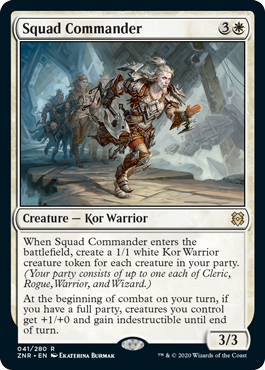
Squad Commander
{3}{W}
Creature — Kor Warrior
3/3
When Squad Commander enters the battlefield, create a 1/1 white Kor Warrior creature token for each creature in your party. (Your party consists of up to one each of Cleric, Rogue, Warrior, and Wizard.)
At the beginning of combat on your turn, if you have a full party, creatures you control get +1/+0 and gain indestructible until end of turn.
- Squad Commander's last ability affects only creatures you control at the time it resolves. Creatures you begin to control later in the turn won't get +1/+0 or gain indestructible.
- Once Squad Commander's last ability has resolved, the affected creatures won't lose +1/+0 or indestructible if you no longer have a full party.
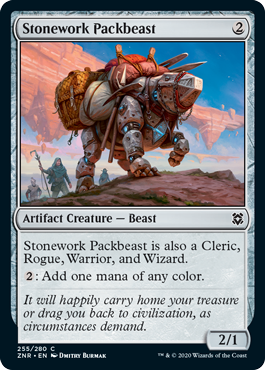
Stonework Packbeast
{2}
Artifact Creature — Beast
2/1
Stonework Packbeast is also a Cleric, Rogue, Warrior, and Wizard.
{2}: Add one mana of any color.
- The ability that adds creature types to Stonework Packbeast applies in all zones, not just the battlefield.
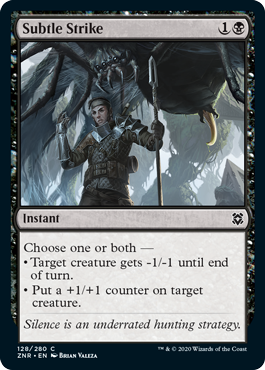
Subtle Strike
{1}{B}
Instant
Choose one or both —
• Target creature gets -1/-1 until end of turn.
• Put a +1/+1 counter on target creature.
- If you choose both modes and one target becomes illegal before Subtle Strike resolves, the other target is affected as appropriate.
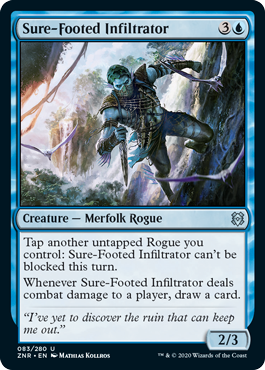
Sure-Footed Infiltrator
{3}{U}
Creature — Merfolk Rogue
2/3
Tap another untapped Rogue you control: Sure-Footed Infiltrator can't be blocked this turn.
Whenever Sure-Footed Infiltrator deals combat damage to a player, draw a card.
- You can tap any other untapped Rogue you control, including one you haven't controlled continuously since the beginning of your most recent turn, to pay the cost of Sure-Footed Infiltrator's first ability.
- Once a creature has blocked Sure-Footed Infiltrator, activating its first ability won't cause it to become unblocked or remove that blocking creature from combat.
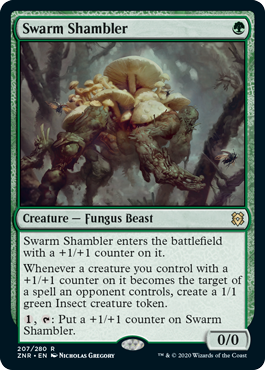
Swarm Shambler
{G}
Creature — Fungus Beast
0/0
Swarm Shambler enters the battlefield with a +1/+1 counter on it.
Whenever a creature you control with a +1/+1 counter on it becomes the target of a spell an opponent controls, create a 1/1 green Insect creature token.
{1}, {T}: Put a +1/+1 counter on Swarm Shambler.
- An ability that triggers when a creature becomes the target of a spell resolves before the spell that caused it to trigger. It resolves even if that spell is countered.
- If a creature without a +1/+1 counter on it becomes the target of a spell an opponent controls, putting a +1/+1 counter on it after that won't cause Swarm Shambler's middle ability to trigger.
- If a spell targets a creature you control with a +1/+1 counter on it more than once, Swarm Shambler's ability triggers only once.
- You create just one Insect token, no matter how many +1/+1 counters the target creature has on it.
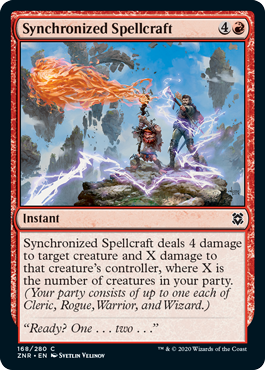
Synchronized Spellcraft
{4}{R}
Instant
Synchronized Spellcraft deals 4 damage to target creature and X damage to that creature's controller, where X is the number of creatures in your party. (Your party consists of up to one each of Cleric, Rogue, Warrior, and Wizard.)
- If the target creature is an illegal target by the time Synchronized Spellcraft tries to resolve, the spell doesn't resolve. No player is dealt damage.
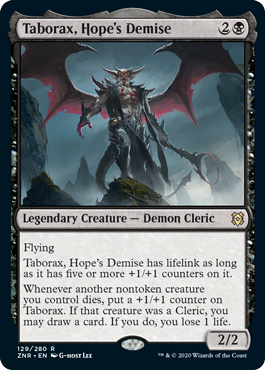
Taborax, Hope's Demise
{2}{B}
Legendary Creature — Demon Cleric
2/2
Flying
Taborax, Hope's Demise has lifelink as long as it has five or more +1/+1 counters on it.
Whenever another nontoken creature you control dies, put a +1/+1 counter on Taborax. If that creature was a Cleric, you may draw a card. If you do, you lose 1 life.
- If another nontoken creature is dealt lethal damage at the same time as Taborax, Taborax dies before its last ability can put a +1/+1 counter on it.
- If another nontoken Cleric dies at the same time as Taborax, you won't put a +1/+1 counter on anything, but you may draw a card as its last ability resolves. You still lose 1 life if you do.
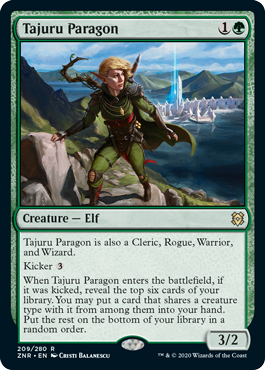
Tajuru Paragon
{1}{G}
Creature — Elf
3/2
Tajuru Paragon is also a Cleric, Rogue, Warrior, and Wizard.
Kicker {3}
When Tajuru Paragon enters the battlefield, if it was kicked, reveal the top six cards of your library. You may put a card that shares a creature type with it from among them into your hand. Put the rest on the bottom of your library in a random order.
- The ability that adds creature types to Tajuru Paragon applies in all zones, not just the battlefield.
- If Tajuru Paragon leaves the battlefield before its triggered ability resolves, use its creature types as it last existed on the battlefield to determine which cards you may put into your hand.
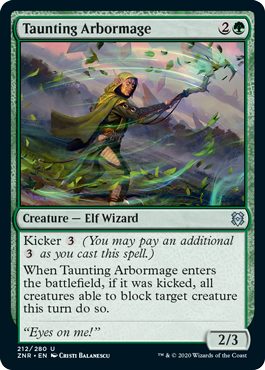
Taunting Arbormage
{2}{G}
Creature — Elf Wizard
2/3
Kicker {3} (You may pay an additional {3} as you cast this spell.)
When Taunting Arbormage enters the battlefield, if it was kicked, all creatures able to block target creature this turn do so.
- If a creature the defending player controls can't block the target creature for any reason (such as being tapped), then it doesn't block that creature. If there's a cost associated with having a creature block the attacking creature, the defending player isn't forced to pay that cost, so it doesn't have to block in that case either.
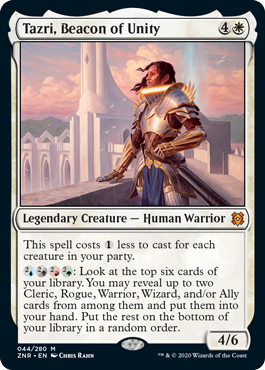
Tazri, Beacon of Unity
{4}{W}
Legendary Creature — Human Warrior
4/6
This spell costs {1} less to cast for each creature in your party.
{2/u}{2/b}{2/r}{2/g}: Look at the top six cards of your library. You may reveal up to two Cleric, Rogue, Warrior, Wizard, and/or Ally cards from among them and put them into your hand. Put the rest on the bottom of your library in a random order.
- To determine the cost of Tazri's activated ability, you choose which cost you'll pay for each of the four mana symbols (either {2} or one mana of the appropriate color), add up the total cost, apply any additional costs, then apply any cost reductions.
- Tazri's activated ability lets you put up to two cards total into your hand, not two cards of each of the listed creature types.
- Ally is a creature type that doesn't appear in the Zendikar Rising set, but it has appeared in previous sets featuring the plane of Zendikar.
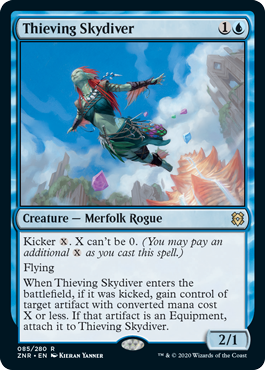
Thieving Skydiver
{1}{U}
Creature — Merfolk Rogue
2/1
Kicker {X}. X can't be 0. (You may pay an additional {X} as you cast this spell.)
Flying
When Thieving Skydiver enters the battlefield, if it was kicked, gain control of target artifact with converted mana cost X or less. If that artifact is an Equipment, attach it to Thieving Skydiver.
- If the Equipment can't be attached to Thieving Skydiver, most likely because Thieving Skydiver has left the battlefield before its triggered ability resolves, the Equipment remains attached to whatever it's currently attached to or remains unattached if attached to nothing.
- Thieving Skydiver's ability can target an artifact you already control. You'll attach it to Thieving Skydiver if it's an Equipment.
- The control-change effect of Thieving Skydiver lasts indefinitely. It doesn't wear off during the cleanup step, and it doesn't expire if Thieving Skydiver leaves the battlefield. In a multiplayer game, it does expire if you leave the game.
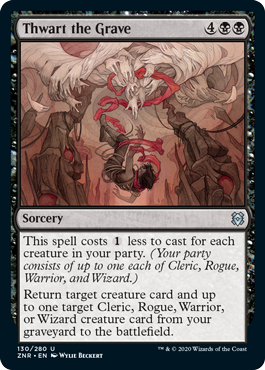
Thwart the Grave
{4}{B}{B}
Sorcery
This spell costs {1} less to cast for each creature in your party. (Your party consists of up to one each of Cleric, Rogue, Warrior, and Wizard.)
Return target creature card and up to one target Cleric, Rogue, Warrior, or Wizard creature card from your graveyard to the battlefield.
- Thwart the Grave's first target doesn't have to be one of the party creature types.
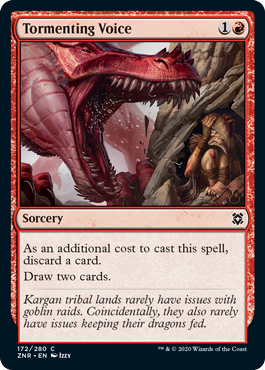
Tormenting Voice
{1}{R}
Sorcery
As an additional cost to cast this spell, discard a card.
Draw two cards.
- You must discard exactly one card to cast Tormenting Voice; you can't cast it without discarding a card, and you can't discard additional cards.
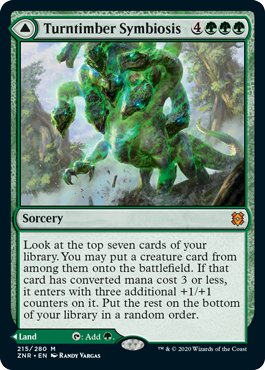
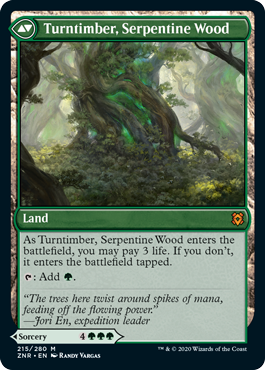
Turntimber Symbiosis
{4}{G}{G}{G}
Sorcery
Look at the top seven cards of your library. You may put a creature card from among them onto the battlefield. If that card has converted mana cost 3 or less, it enters with three additional +1/+1 counters on it. Put the rest on the bottom of your library in a random order.
/////
Turntimber, Serpentine Wood
Land
As Turntimber, Serpentine Wood enters the battlefield, you may pay 3 life. If you don't, it enters the battlefield tapped.
{T}: Add {G}.
- Use the converted mana cost of the creature card as it exists in your library to determine whether it receives +1/+1 counters, ignoring any replacement effects (such as that of Glasspool Mimic) that will change its converted mana cost once it's on the battlefield.
- If a card in a player's library has {X} in its mana cost, X is considered to be 0.
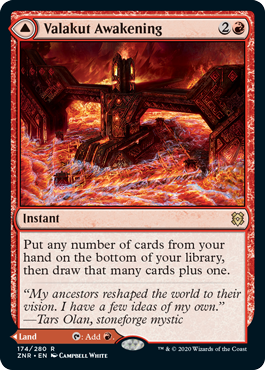
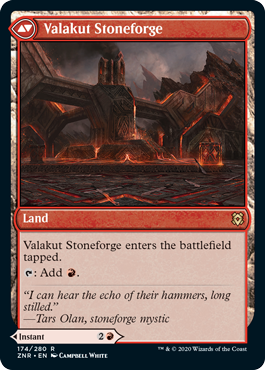
Valakut Awakening
{2}{R}
Instant
Put any number of cards from your hand on the bottom of your library, then draw that many cards plus one.
/////
Valakut Stoneforge
Land
Valakut Stoneforge enters the battlefield tapped.
{T}: Add {R}.
- You choose how many cards to put on the bottom of your library as Valakut Awakening resolves.
- If you put zero cards on the bottom of your library, you draw one card.
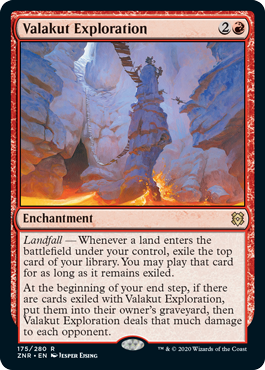
Valakut Exploration
{2}{R}
Enchantment
Landfall — Whenever a land enters the battlefield under your control, exile the top card of your library. You may play that card for as long as it remains exiled.
At the beginning of your end step, if there are cards exiled with Valakut Exploration, put them into their owner's graveyard, then Valakut Exploration deals that much damage to each opponent.
- You must follow the normal timing permissions and restrictions for the exiled card. If it's a land, you can't play it unless you have land plays available.
- You'll still pay all costs for a spell cast this way, including additional costs. You may also pay alternative costs if any are available.
- If you play a card this way, it leaves exile and becomes a new object. If it returns to exile later in the turn, you can't play it again.
- If you play the card in response to the end step triggered ability, that card won't be put into your graveyard and won't be counted when determining how much damage to deal.
- If Valakut Exploration leaves the battlefield, any cards exiled with it remain exiled and can be played. The end step triggered ability won't trigger, and the cards won't be put into their owner's graveyard.
- In a Two-Headed Giant game, the end step triggered ability causes the opposing team to lose 2 life for each card put into its owner's graveyard.
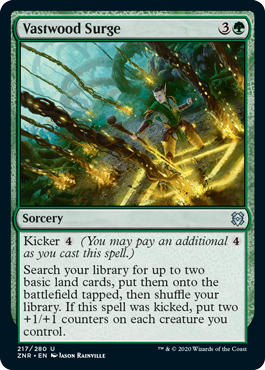
Vastwood Surge
{3}{G}
Sorcery
Kicker {4} (You may pay an additional {4} as you cast this spell.)
Search your library for up to two basic land cards, put them onto the battlefield tapped, then shuffle your library. If this spell was kicked, put two +1/+1 counters on each creature you control.
- If any abilities trigger when the lands are put onto the battlefield and Vastwood Surge was kicked, those abilities won't resolve until after you've put two +1/+1 counters on creatures you control.
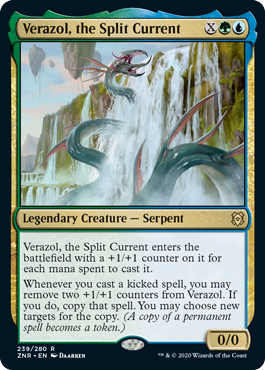
Verazol, the Split Current
{X}{G}{U}
Legendary Creature — Serpent
0/0
Verazol, the Split Current enters the battlefield with a +1/+1 counter on it for each mana spent to cast it.
Whenever you cast a kicked spell, you may remove two +1/+1 counters from Verazol. If you do, copy that spell. You may choose new targets for the copy. (A copy of a permanent spell becomes a token.)
- The amount of mana you spent to cast Verazol is usually equal to its converted mana cost, normally 2 plus the value chosen for X. However, you also include any additional costs you pay, including the "commander tax" in a Commander game.
- If Verazol enters the battlefield without being cast, then no mana was spent to cast it. It enters the battlefield without any +1/+1 counters. If no other effects are increasing its toughness at that time, it will be put into its owner's graveyard as a state-based action.
- If another creature enters the battlefield as a copy of Verazol, consider how much mana was spent to cast that creature to determine how many +1/+1 counters it enters with.
- Verazol's last ability can copy any kicked spell, not just one with targets.
- You can't remove more than two counters as Verazol's last ability resolves to copy the spell more than once. You can't remove just one counter from it if it has only one. If Verazol leaves the battlefield while its last ability is on the stack, you can't remove two +1/+1 counters from it at all.
- A copy is created even if the spell that caused Verazol's last ability to trigger has been countered by the time that ability resolves. The copy resolves before the original spell.
- The copy will have the same targets as the spell it's copying unless you choose new ones. You may change any number of the targets, including all of them or none of them. The new targets must be legal.
- If the spell that's copied is modal (that is, it says "Choose one —" or the like), the copy will have the same mode or modes. You can't choose different ones. This doesn't apply to copying a permanent spell with a modal enters-the-battlefield ability.
- For spells with {X} in their mana costs, the copy has the same value of X.
- You can't choose to pay any additional costs for the copy. However, effects based on any additional costs that were paid for the original spell are copied as though those same costs were paid for the copy too. Most notably, the copy is also kicked.
- The copy is created on the stack, so it's not "cast." Abilities that trigger when a player casts a spell won't trigger.
- If a permanent spell is copied, it's put onto the battlefield as a token as the spell resolves rather than putting the copy of the spell onto the battlefield. The rules that apply to a permanent spell becoming a permanent apply to a copy of a spell becoming a token.
- The token that a resolving copy of a spell becomes isn't said to have been "created."
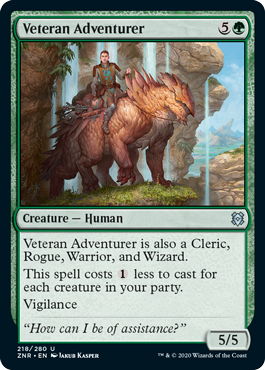
Veteran Adventurer
{5}{G}
Creature — Human
5/5
Veteran Adventurer is also a Cleric, Rogue, Warrior, and Wizard.
This spell costs {1} less to cast for each creature in your party.
Vigilance
- The ability that adds creature types to Veteran Adventurer applies in all zones, not just the battlefield.
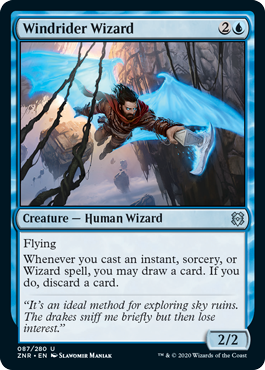
Windrider Wizard
{2}{U}
Creature — Human Wizard
2/2
Flying
Whenever you cast an instant, sorcery, or Wizard spell, you may draw a card. If you do, discard a card.
- You draw a card and discard a card while Windrider Wizard's last ability is resolving. No player may take actions between those events, and nothing can happen.
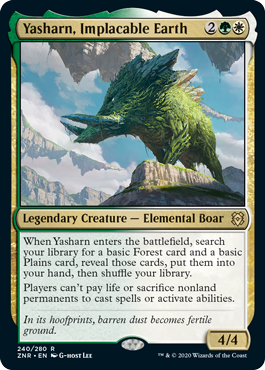
Yasharn, Implacable Earth
{2}{G}{W}
Legendary Creature — Elemental Boar
4/4
When Yasharn enters the battlefield, search your library for a basic Forest card and a basic Plains card, reveal those cards, put them into your hand, then shuffle your library.
Players can't pay life or sacrifice nonland permanents to cast spells or activate abilities.
- Yasharn's first ability can find just one basic Forest or one basic Plains card if you don't have both in your library or if you don't wish to find both.
- If a spell or activated ability has a cost that requires a player to pay life (such as the activated ability granted by Lithoform Blight) or sacrifice a permanent (such as Kazuul's Fury or Spare Supplies), that spell or ability can't be cast or activated.
- Other things may still cause players to pay life or sacrifice creatures, such as a resolving spell or ability.
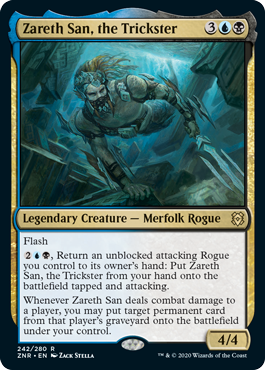
Zareth San, the Trickster
{3}{U}{B}
Legendary Creature — Merfolk Rogue
4/4
Flash
{2}{U}{B}, Return an unblocked attacking Rogue you control to its owner's hand: Put Zareth San, the Trickster from your hand onto the battlefield tapped and attacking.
Whenever Zareth San deals combat damage to a player, you may put target permanent card from that player's graveyard onto the battlefield under your control.
- Before blockers are declared, attacking Rogues are neither blocked nor unblocked, so you can't pay the cost to activate Zareth San's second ability.
- To activate Zareth San's second ability, you reveal it in your hand. It remains revealed until the ability has resolved.
- If Zareth San leaves your hand before its second ability resolves, the ability does nothing as it resolves. Zareth San remains in its new zone and the Rogue you returned remains in its owner's hand.
- You choose which player or planeswalker Zareth San is attacking. It doesn't have to be attacking the same player or planeswalker that the returned Rogue was attacking.
- Although Zareth San is attacking, it was never declared as an attacking creature (for purposes of abilities that trigger whenever a creature attacks, for example).
- Zareth San's second ability can be activated during the declare blockers step, combat damage step, or end of combat step. If you wait until after the declare blockers step, because all combat damage is dealt at once, Zareth San won't normally deal combat damage.
- If a creature in combat has first strike or double strike, you can activate Zareth San's second ability during the first-strike combat damage step. Zareth San will deal combat damage during the regular combat damage step in this case, even if it somehow gains first strike.
- In a multiplayer game, if a player leaves the game, all cards that player owns leave as well. If you leave the game, any permanents you control from Zareth San's last ability are exiled.
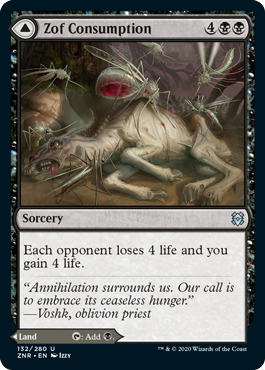
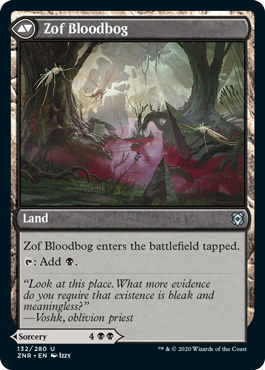
Zof Consumption
{4}{B}{B}
Sorcery
Each opponent loses 4 life and you gain 4 life.
/////
Zof Bloodbog
Land
Zof Bloodbog enters the battlefield tapped.
{T}: Add {B}.
- In a Two-Headed Giant game, Zof Consumption causes the opposing team to lose 8 life and you to gain 4 life.
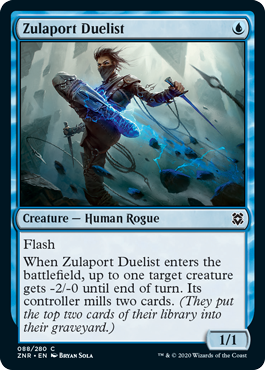
Zulaport Duelist
{U}
Creature — Human Rogue
1/1
Flash
When Zulaport Duelist enters the battlefield, up to one target creature gets -2/-0 until end of turn. Its controller mills two cards. (They put the top two cards of their library into their graveyard.)
- If the target creature is an illegal target by the time Zulaport Duelist's ability tries to resolve, the ability doesn't resolve. No player mills two cards.
ZENDIKAR RISING COMMANDER CARD-SPECIFIC NOTES
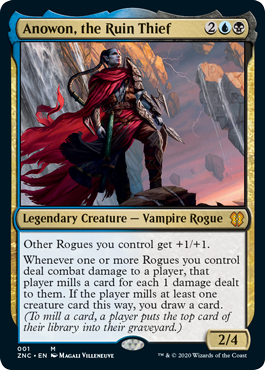
Anowon, the Ruin Thief
{2}{U}{B}
Legendary Creature — Vampire Rogue
2/4
Other Rogues you control get +1/+1.
Whenever one or more Rogues you control deal combat damage to a player, that player mills a card for each 1 damage dealt to them. If the player mills at least one creature card this way, you draw a card. (To mill a card, a player puts the top card of their library into their graveyard.)
- Because damage remains marked on a creature until the damage is removed as the turn ends, nonlethal damage dealt to other Rogues you control may become lethal if Anowon leaves the battlefield during that turn.
- The player dealt combat damage mills cards only for the damage dealt by your Rogues, not for any other combat damage dealt to them at the same time.
- You draw just one card, no matter how many creature cards the player mills beyond the first.
- If Rogues you control deal combat damage to two players at once, Anowon's ability triggers twice.
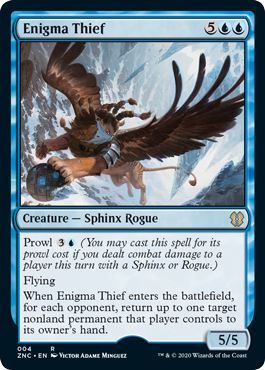
Enigma Thief
{5}{U}{U}
Creature — Sphinx Rogue
5/5
Prowl {3}{U} (You may cast this spell for its prowl cost if you dealt combat damage to a player this turn with a Sphinx or Rogue.)
Flying
When Enigma Thief enters the battlefield, for each opponent, return up to one target nonland permanent that player controls to its owner's hand.
- To determine the total cost of a spell, start with the mana cost or alternative cost (such as a prowl cost) you're paying, add any cost increases, then apply any cost reductions. The converted mana cost of the spell is determined only by its mana cost, no matter what the total cost to cast the spell was.
- You can cast a spell for its prowl cost any time in a turn after a creature you control of a matching type has dealt combat damage to a player. It doesn't matter if that player left the game, if that creature left the battlefield or left your control, or if that creature no longer has a matching type.
- Prowl compares the creature types of the spell with the creature types of the creatures that dealt combat damage to players this turn. Normally this means that you can cast Enigma Thief for its prowl cost only if a Sphinx or Rogue dealt combat damage to a player, but if an effect causes the spell to have other creature types, the prowl ability is also satisfied by a creature with those additional types having dealt combat damage to a player.
- If a nonland permanent changes control while it's the target of Enigma Thief's ability, that permanent won't be a legal target as the ability resolves. Any remaining legal targets will be returned to their owners' hand.
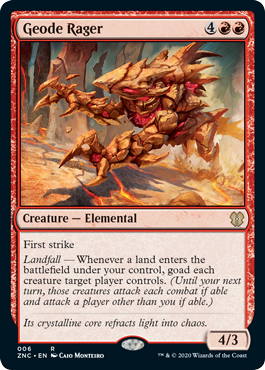
Geode Rager
{4}{R}{R}
Creature — Elemental
4/3
First strike
Landfall — Whenever a land enters the battlefield under your control, goad each creature target player controls. (Until your next turn, those creatures attack each combat if able and attack a player other than you if able.)
- Creatures that enter the battlefield or come under the target player's control after Geode Rager's ability has resolved won't be goaded.
- If a goaded creature can't attack for any reason (such as being tapped or having come under that player's control that turn), then it doesn't attack. If there's a cost associated with having it attack, its controller isn't forced to pay that cost, so it doesn't have to attack in that case either.
- If a goaded creature doesn't meet any of the above exceptions and can attack, it must attack a player other than a player who goaded it if able. It the creature can't attack any of those players but could otherwise attack, it must attack an opposing planeswalker (controlled by any opponent) or a player who goaded it.
- Attacking with a goaded creature doesn't cause it to stop being goaded.
- Being goaded more than once by the same player is redundant.
- If you goad a creature you control, it must attack, and it must attack a player rather than a planeswalker.
- If a creature you control has been goaded by multiple opponents, it must attack one of your opponents who hasn't goaded it. If a creature you control has been goaded by each of your opponents, you choose which opponent it attacks.
- If you leave the game, any creatures you've goaded remain goaded until your next turn would have begun. They don't immediately stop being goaded and don't remain goaded indefinitely.
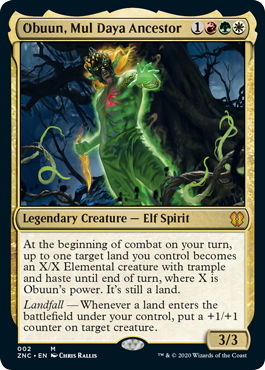
Obuun, Mul Daya Ancestor
{1}{R}{G}{W}
Legendary Creature — Elf Spirit
3/3
At the beginning of combat on your turn, up to one target land you control becomes an X/X Elemental creature with trample and haste until end of turn, where X is Obuun's power. It's still a land.
Landfall — Whenever a land enters the battlefield under your control, put a +1/+1 counter on target creature.
- Obuun's first ability doesn't remove any abilities the land creature has.
- Obuun's first ability can target a land that's already a creature. This overwrites any previous effects that set the land creature's power and/or toughness to specific values. Other effects that set these characteristics to specific values that start to apply after the ability resolves will overwrite that part of the effect.
- Effects that modify the power or toughness of the land creature without setting it will apply to its new base power and toughness no matter when they started to take effect. The same is true for counters that change its power and toughness.
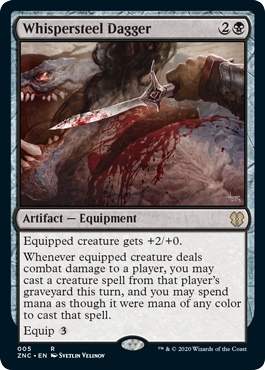
Whispersteel Dagger
{2}{B}
Artifact — Equipment
Equipped creature gets +2/+0.
Whenever equipped creature deals combat damage to a player, you may cast a creature spell from that player's graveyard this turn, and you may spend mana as though it were mana of any color to cast that spell.
Equip {3}
- You don't choose a card to cast as Whispersteel Dagger's ability resolves. You simply get a permission to cast one later.
- You must follow the normal timing permissions and restrictions for the spell you wish to cast.
- You'll still pay all costs for a spell cast this way, including additional costs. You may also pay alternative costs if any are available.
- In a multiplayer game, if a player leaves the game, all cards that player owns leave as well. If you leave the game, any spells and/or permanents you control from Whispersteel Dagger's ability are exiled.
Magic: The Gathering, Magic, Zendikar, Throne of Eldraine, Theros, and Ikoria are trademarks of Wizards of the Coast LLC in the USA and other countries. ©2020 Wizards.
